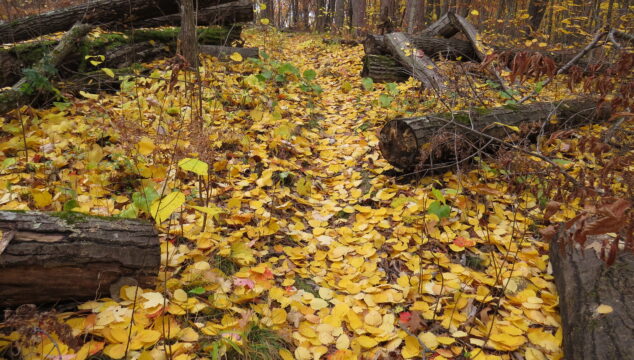Come walk with me in the peak Autumn beauty of the Northwoods. To say that I love this time of year is an understatement. Most everyone can appreciate the colorful falling leaves---it reveals the 'true self' of a tree when its leaves are no longer producing chlorophyll. Their true colors are revealed, and there is something simple … [Read More...]
Archives for September 2021
Flow
Night slipped away as the dawn quietly and confidently displayed its pastel colors in sky and water. Chris and I crept through camp to the high boulder overlooking the track-filled wetland, hoping to catch a glimpse of a morning moose or bear. But nothing caught our attention beyond the dawn sky.
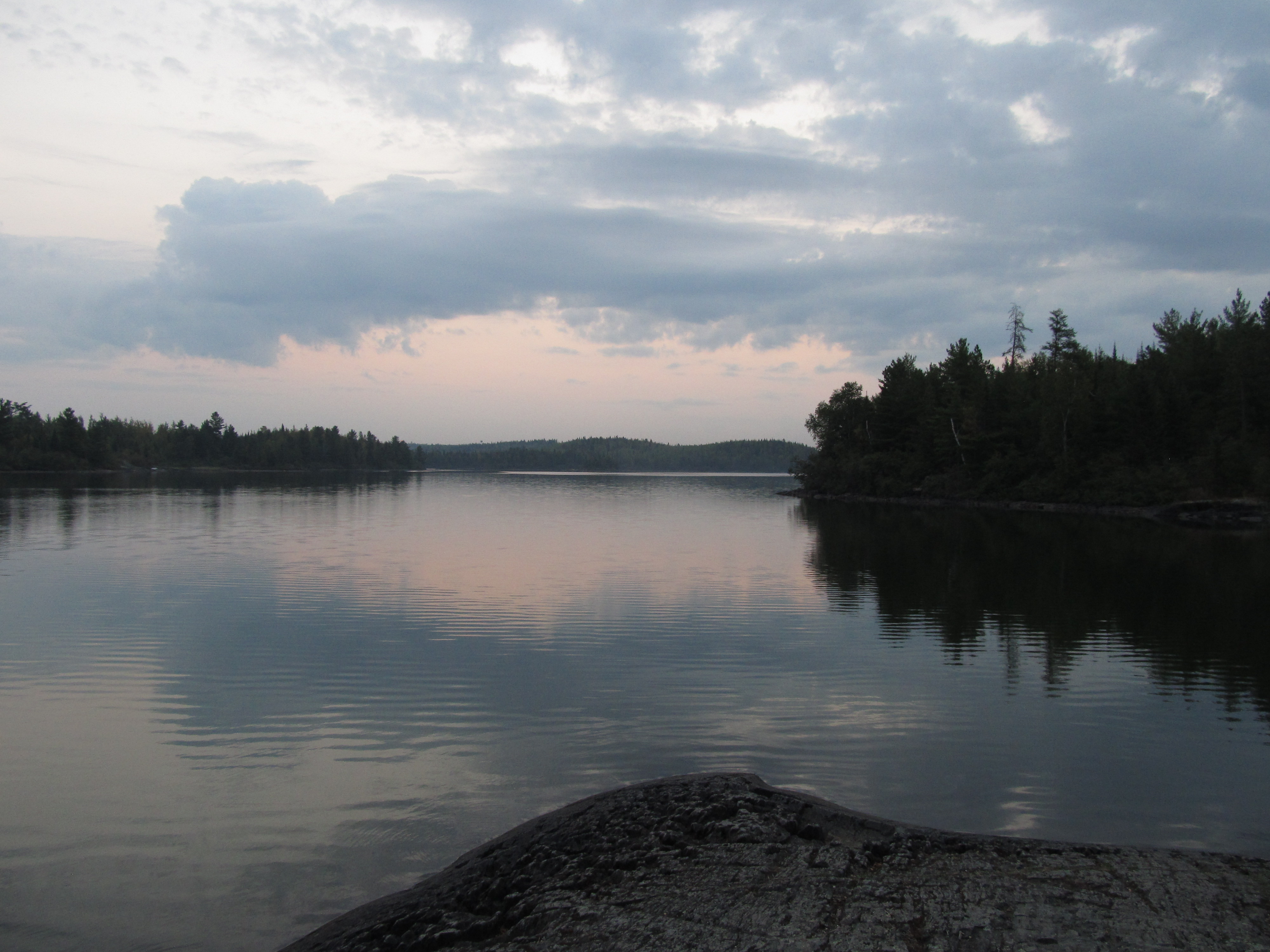

The kids were beginning to stir when we got back to camp. Breakfast and packing up on the last morning of our trip felt easier because of practice and a bit sad because of the flow I was starting to feel. I felt like I could do this for another five days, now that I had overcome some of the challenges.
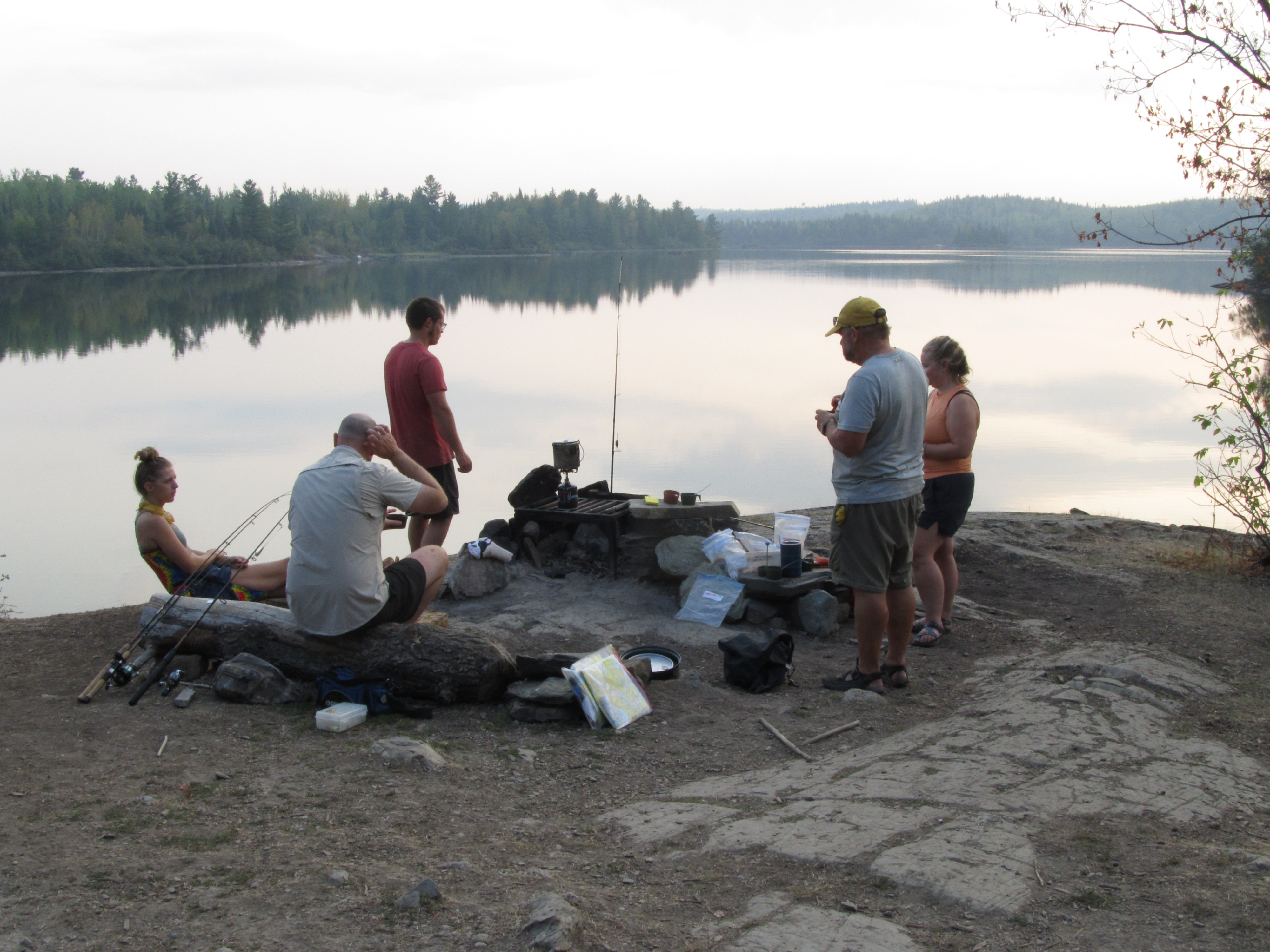
With the sun to our backs, we glided away from our campsite. Chris and I were the first ones out, with Emily’s directive to find the short portage at the west end of the lake. We had only paddled a few hundred yards, which by the way, was going extremely smoothly compared to every other morning—hooray!—when I was looking over at a large beaver lodge on the shore. I noticed two pointy ears sticking up behind the lodge. I got super excited, stopped paddling, fumbled to get my camera out of my life jacket, whispered ‘Wolf!’ to Chris who I don’t think heard me, and started taking pictures.


But I didn’t have to hurry—he was not afraid of us. He watched us watching him, then turned and looked at the kids farther back, then turned back to us. A beautiful black wolf! He was fairly thin with a sleek summer coat, and I wondered if he was hoping to catch a beaver this fine morning. I was so happy to see him! What an amazing creature! He stayed there long enough for the kids to paddle close enough to see him, then turned and walked into the forest.
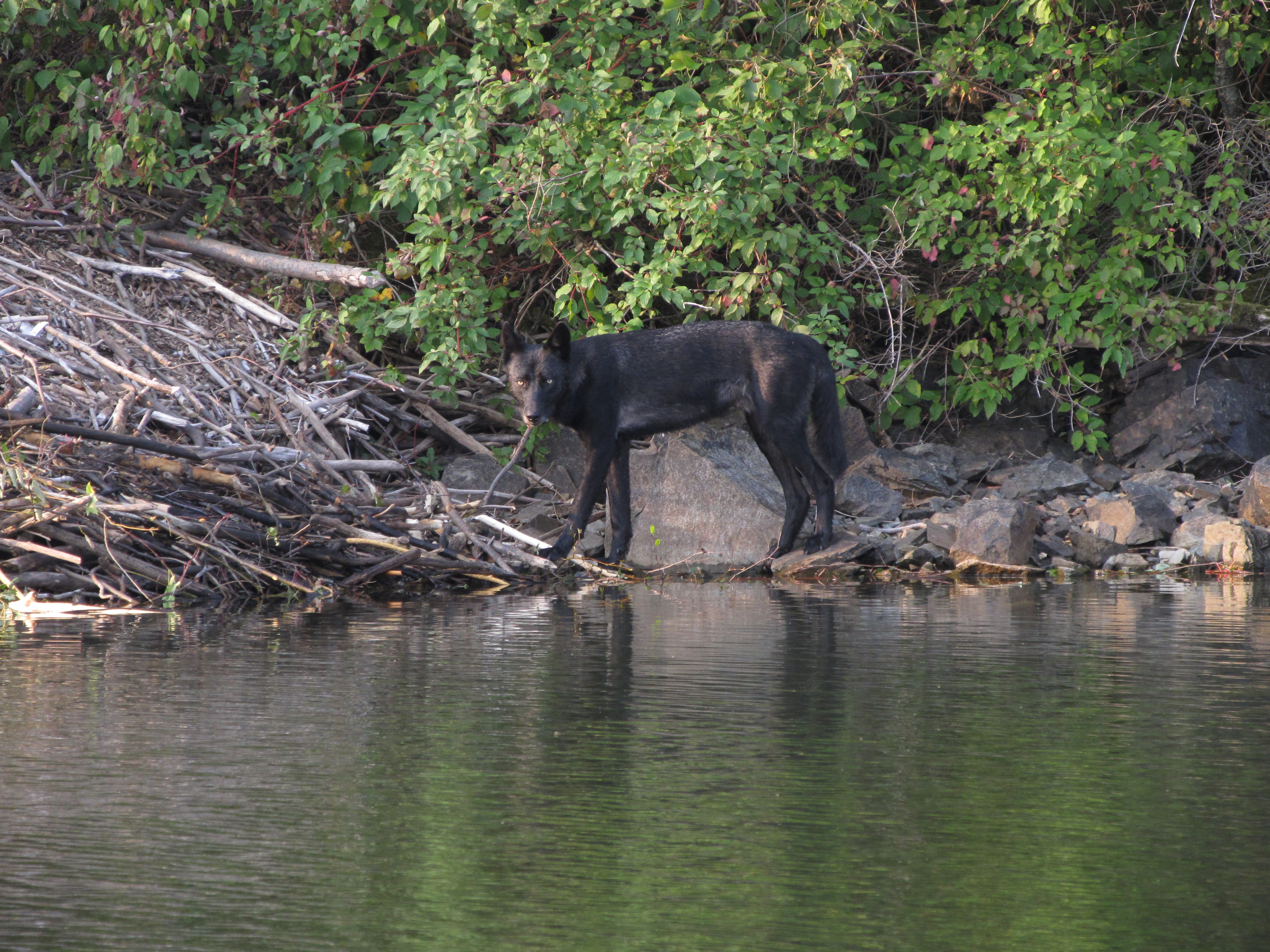
We passed by a campsite right before the portage where two men were preparing their breakfast—one was slight, old, and bent over at the shoulders. He greeted us enthusiastically with information I didn’t really understand. He said half the people were portaging through the five-rod portage and the other half were pulling through. I smiled, nodded, and thanked him, not having a clue about the ‘pulling through’ thing. When Aaron caught up to us, he explained that sometimes, depending on the water level of the creek/river that connects the two lakes, you can get out and walk the creek and pull the packed canoe through to the next lake. I wanted to try that! It was fun, and it worked! Easy! The river channel into Splash Lake was calm and beautiful.


It was not far to our next and last portage, a thirty-rod portage that would return us to Newfound and Moose Lakes where we began our trek. When we got close to the portage, we could see it was the busiest of all the portages we had been through. We let a group of guys pass by us but could also see a group (or two?) coming into Splash Lake from the other way. It was kind of a mess. Emily had warned us earlier that she had little patience for such portage messiness—there is portage protocol, courtesy, and responsibility, and when people breeched that in obtuse ways, she moves into ‘take charge’ mode. A group of people with excessive piles of gear—folding camp chairs, Coleman camp stoves, tents, bags, canoes, etc.—were standing around. Were they waiting for more things? We disembarked and swiftly got packed up and canoed up with Emily and Zoe in the lead. Aaron was the last one out with a pack and canoe and took an alternate route through low branches because the other group had started to move into the lake—bad form on their part. Our last portage was still smooth in the midst of messiness, and I was proud of our strong, experienced kids.
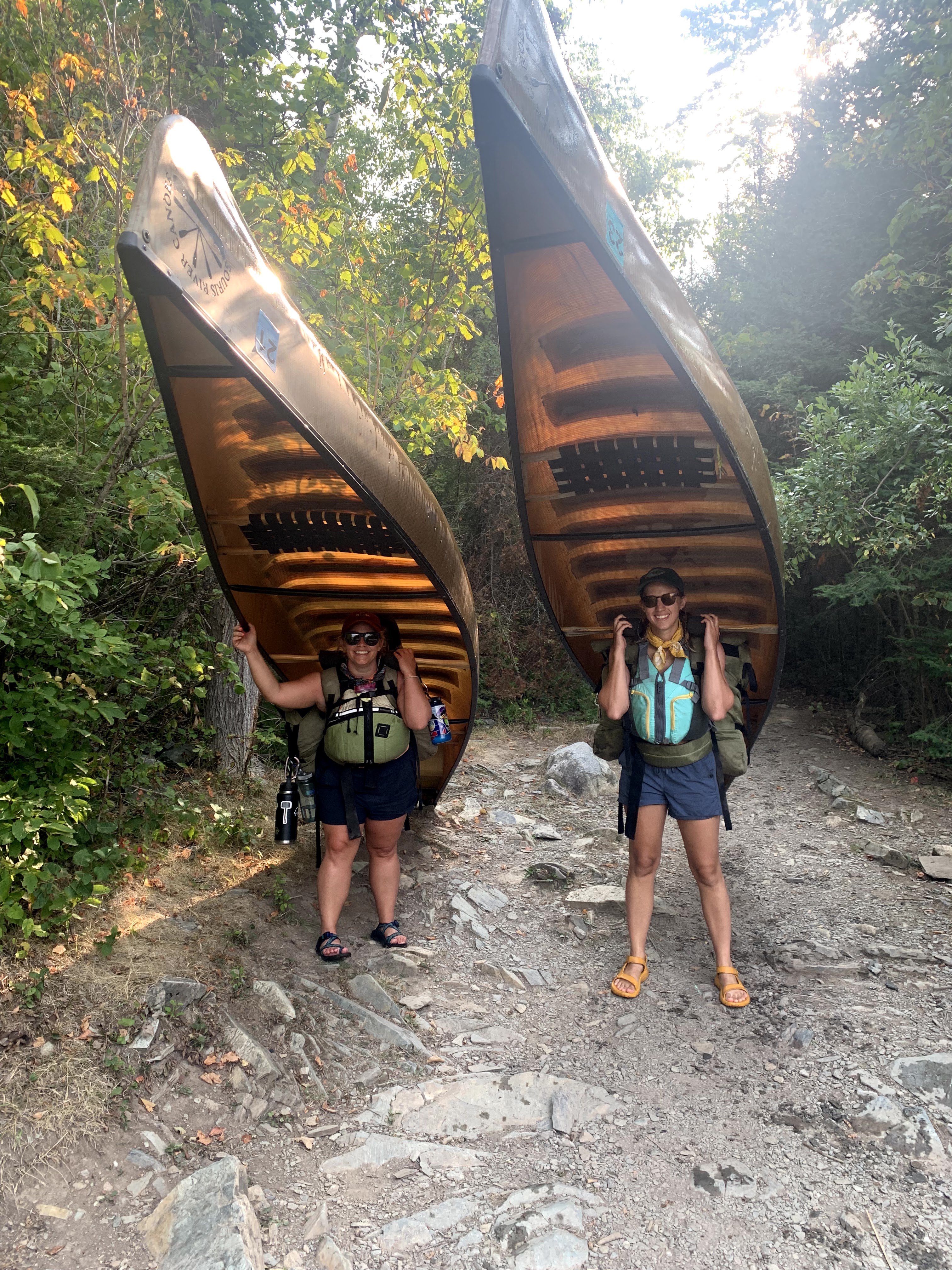
At the other side of the portage sat a man in a motorboat who had ‘towed’ in the last group and their gear. He had even portaged things through for them. He was waiting for another group that was coming out that would ride back to their landing instead of paddling back. He said he had plenty of time for a nap, however.
We paddled on through the wide channel into Newfound Lake. I was startled when an eagle flew from a nearby tree, out above us, to a tree in front of us. When we ‘caught up’ to him, he flew ahead to another tree. We and he were at the end of a point, the end of the channel, and when we caught up to him again, he flew into the forest. It was like he was guiding us to Newfound Lake, to Horseshoe Island, back to where we had started five days before.
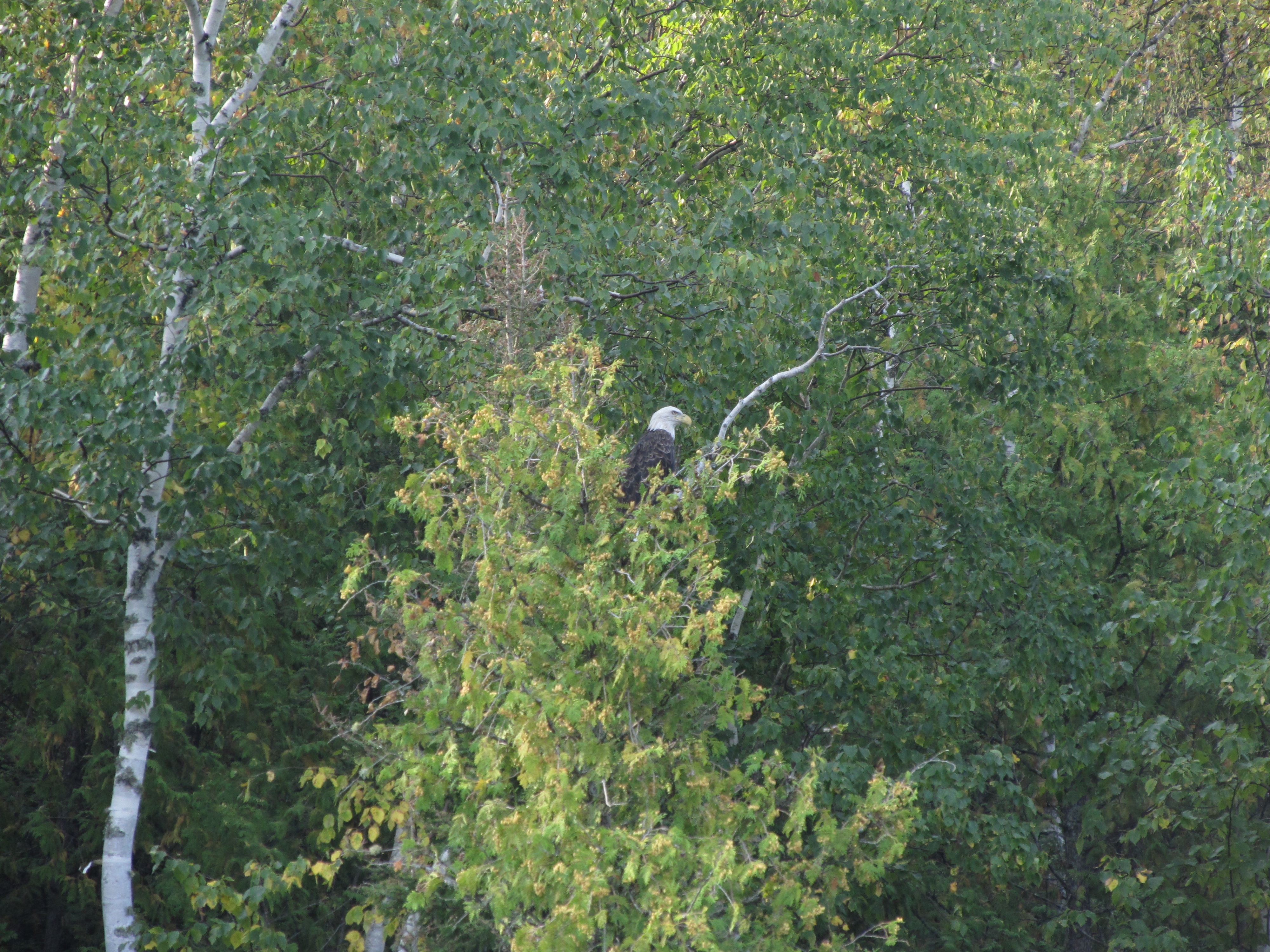
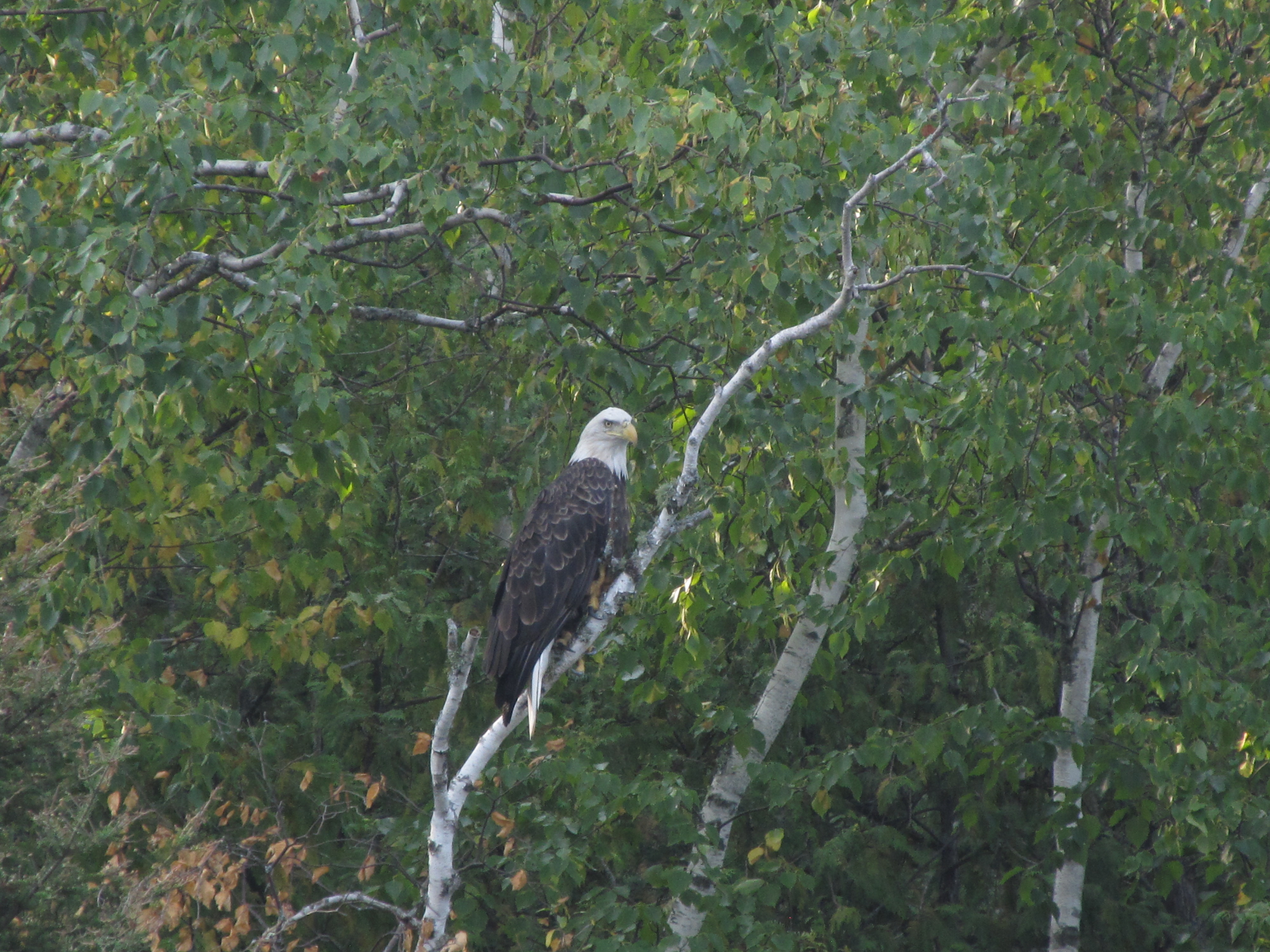

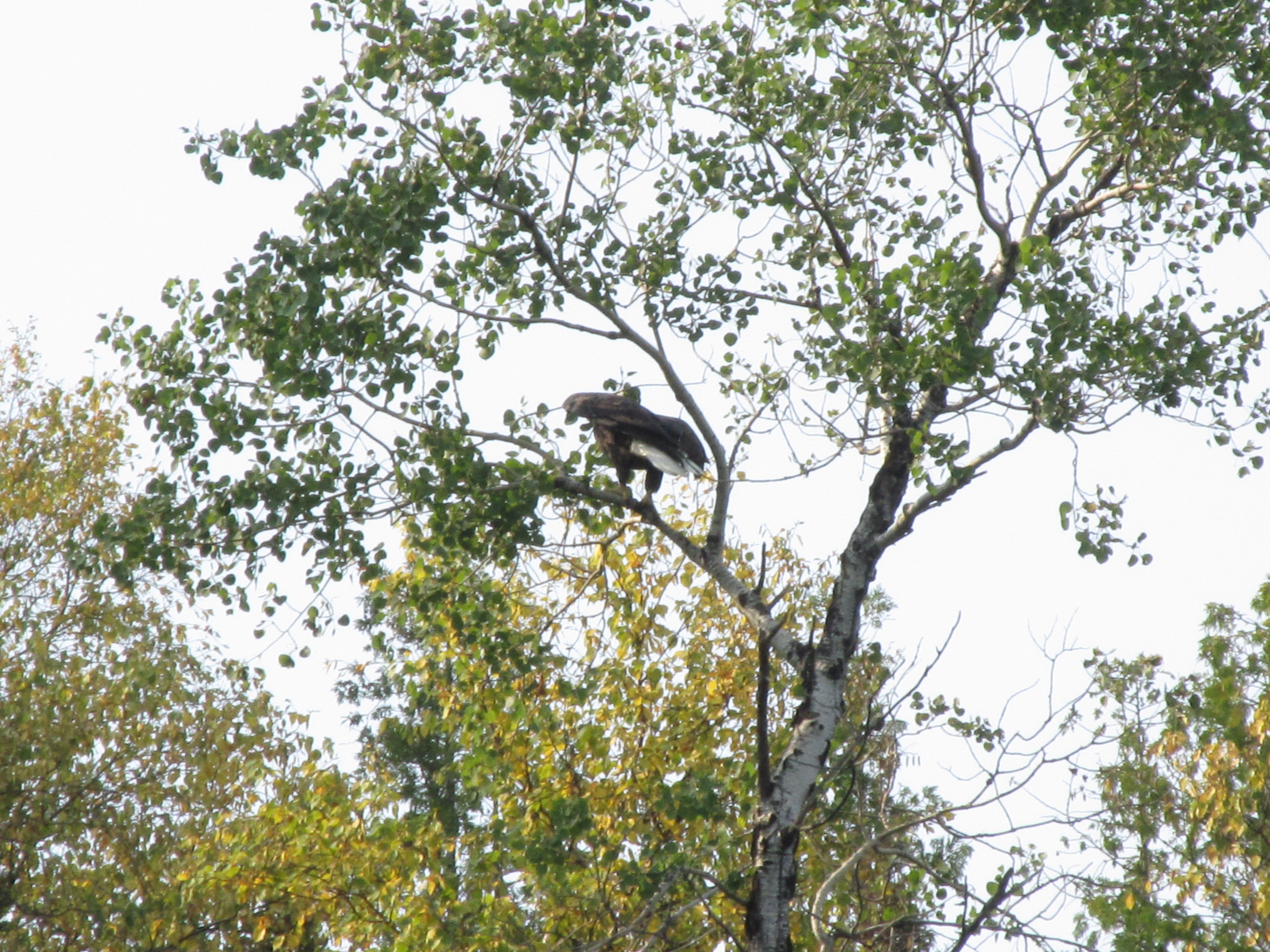
As we paddled through Newfound Lake, we saw a group of four canoes leave a campsite as we passed by. It was a group of all men, and it soon became evident that there was one canoe that could not keep up with the others. (Sounds and feels very familiar.) The ‘lead’ canoe had a boisterous bearded man in the back who was drinking coffee, singing, and at various times, playing the ukulele! They would paddle ahead, then stop and wait for the slow canoe to catch up. We were on par with the slow canoe, so we saw and heard the exuberant troubadour many times. His singing drifted back to us as we got to the windy, wavy Moose Lake. Emily reminded me that I would have to dig in and keep paddling as we headed into the wind—and I did. I was in the flow—I knew what to do, my muscles were strong, my mind was grateful, and the troubadour sang us on. “Toes in the water…not a worry in the world…life is good today.” **
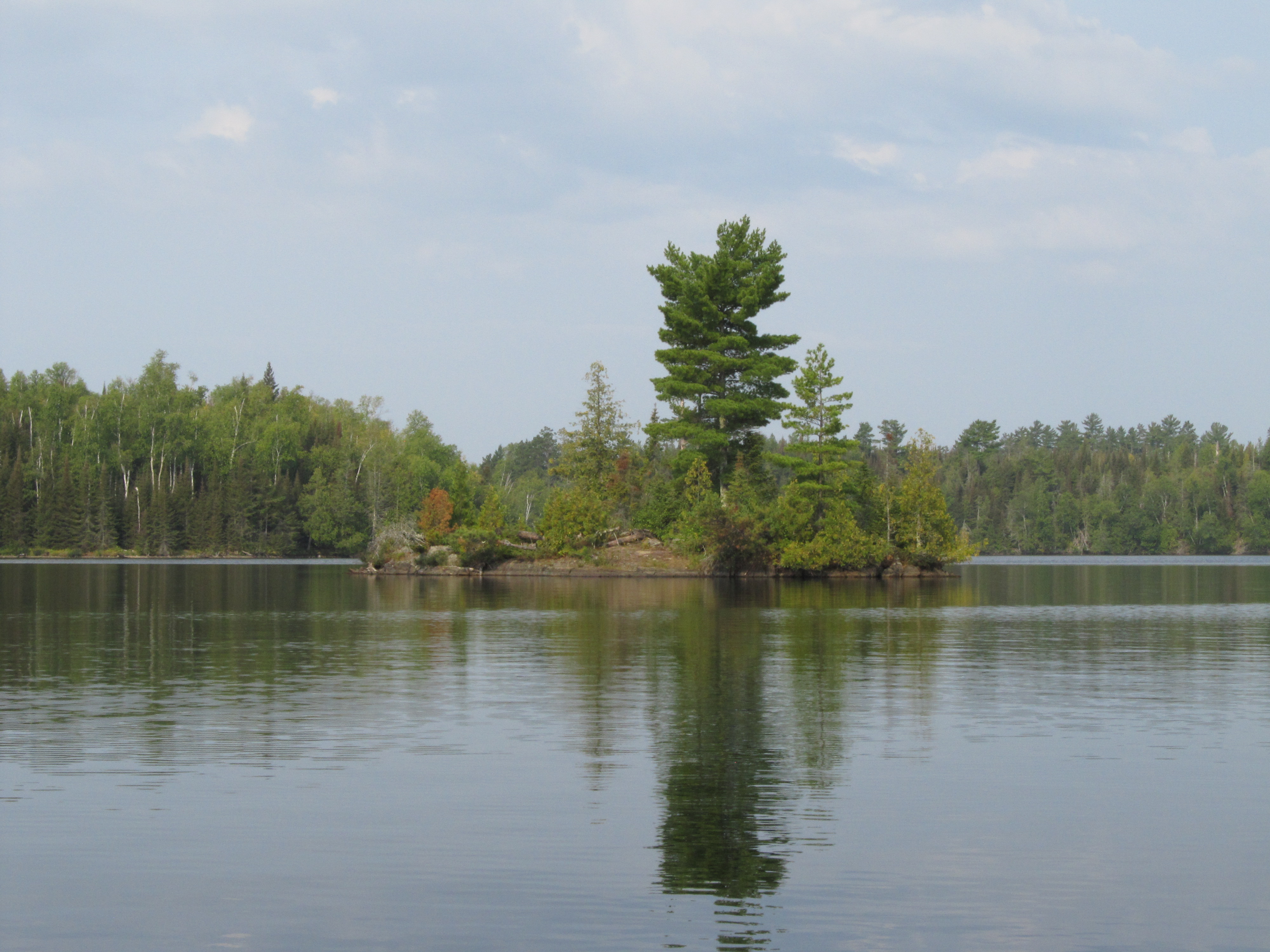
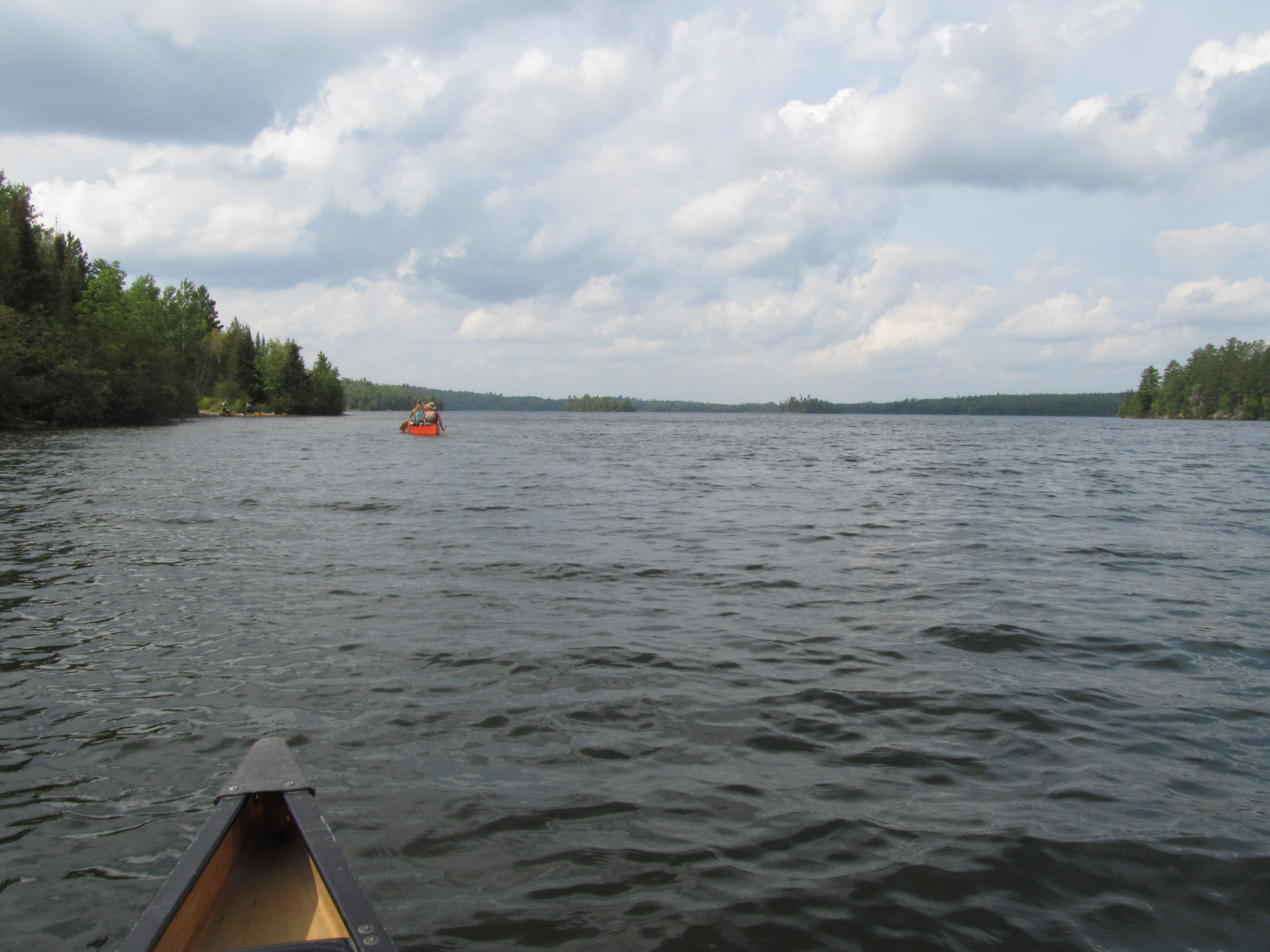
Three hours and six and a half miles after seeing the wolf, we were pulling into the Moose Lake landing. I couldn’t believe it was over! But it wasn’t quite over. We unpacked, repacked, returned gear to KWK, took our unbathed bodies into the coffee shop in Ely (a common sight/smell in Ely), and took off for Duluth and the shining Lake Superior where we would shower, get a burger and beer, and sleep in a bed.

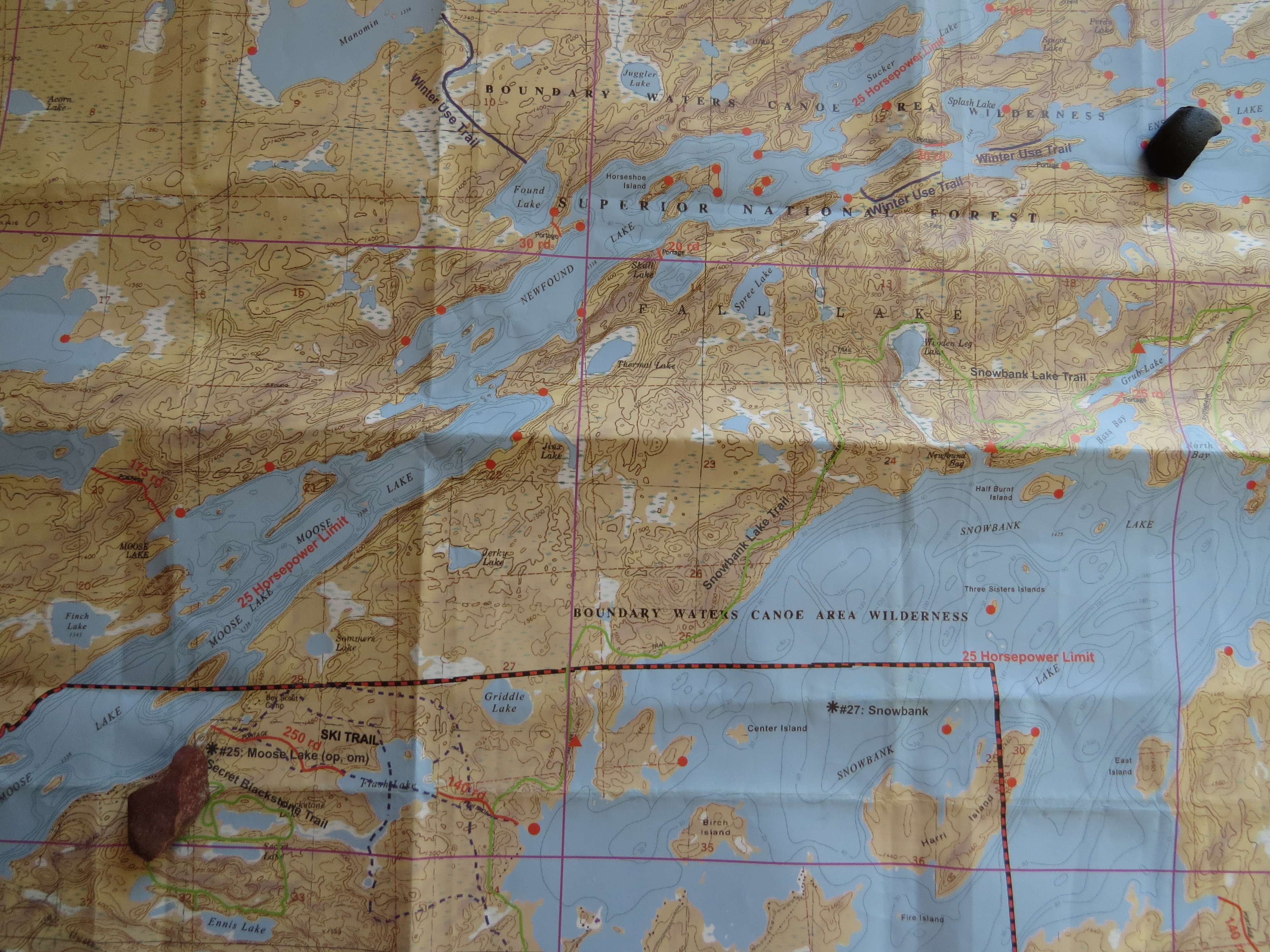

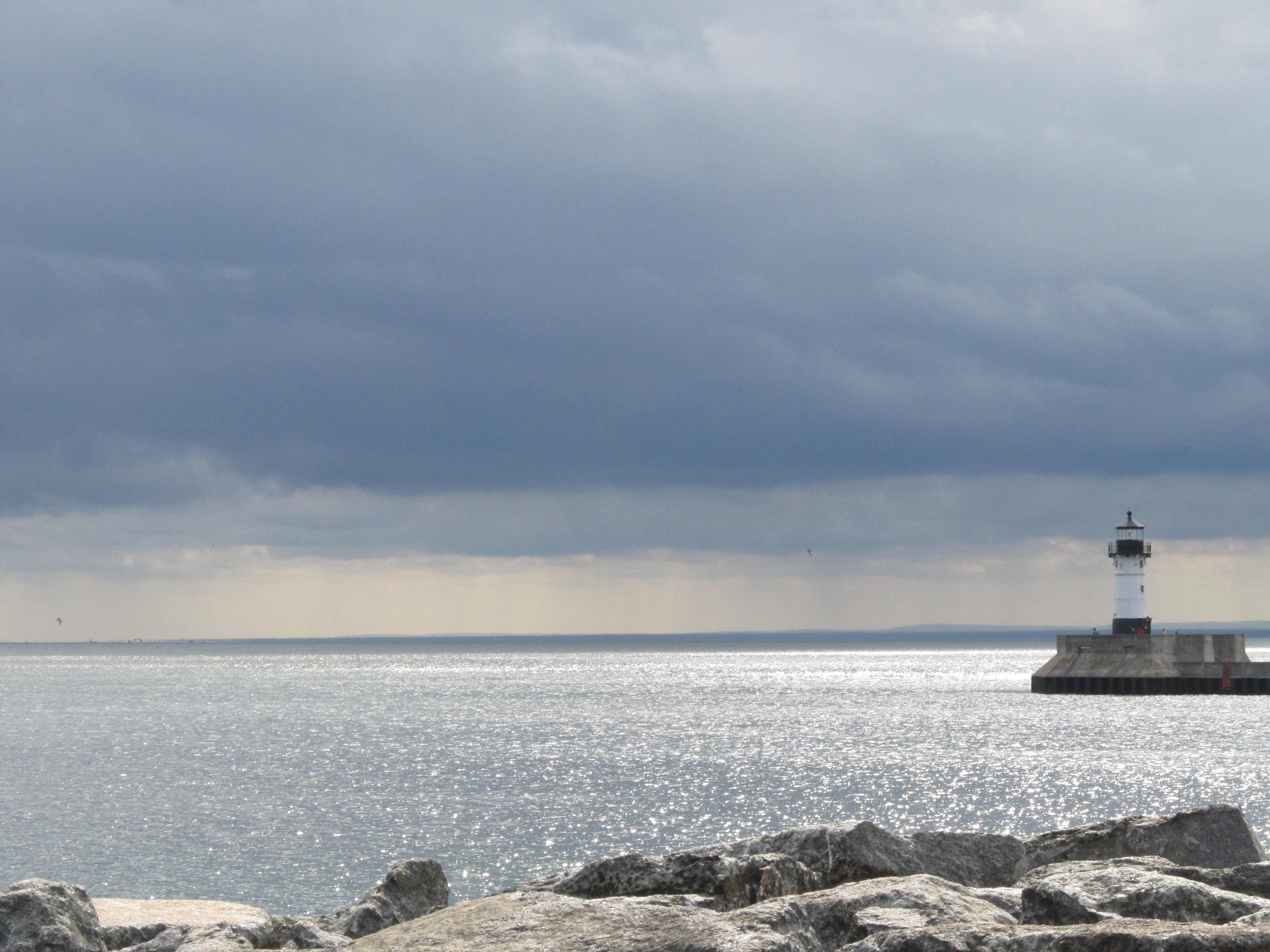
As we re-entered ‘normal’ life from the wilderness, the processing of the trip began. But even as small a town as Ely is, it was rather shocking to me and my body with all the people, cell phones and towers, cars, stores, etc. It was ‘too much’ at the beginning—I wanted to be back in the quiet trees and water. The week had been a mini-lifetime, when you start out as a young novice full of anticipation and excitement, then trials and tribulations pull you down and threaten your will to go on, when challenges of all sorts throw roadblocks to mind and body, then accomplishments and triumphs build confidence, and finally, transcendence and flow ‘miraculously’ appear. It was a hero’s journey for me, when time is of a different realm and the universe has lessons to teach.
As the week had progressed, it became evident that our bodies are meant to move and that we can be sustained on much less food, even with that exertion, than we typically ingest in our ‘normal’ life. I felt better, stronger, more able, and happier as the week went on—it was like my DNA recognized this way of being, and my body responded.
I also realized how often we ‘give away’ our precious time to external standards and pastimes that actually have little meaning or benefit to our lives. Just the idea of running every aspect of our life by the clock is challenged when you live without one. It was disorienting at first, to be sure, but as the week progressed, a natural rhythm ensued that seemed to benefit us all (even when we determined we should get an ‘early start’ the next day.) And then there’s the internet and social media….for those of us who have lived a substantial period of our lives without it, we can ‘remember’ how we had perfectly wonderful lives before its invention and access…but how many have forgotten that? Life is fully lived in the wilderness without computers and cell phones, and there was a heart-filling freedom to experiencing that with our adult children.
That leads me to the third take-away from the week—how we can’t do this thing called life alone. We need one another. From the beginning stages of our planning for the BWCA trip, I needed and appreciated the advice and knowledge from our kids who had planned and led so many previous trips. Experience and expertise matters. It matters not for individual glory and adulation but for how it can help people. From day one of our journey (and for forty years before that), I am grateful to have my partner Chris beside me (or behind me in the canoe) giving me encouragement and support—through every doubt, freakout, breakdown, triumph, excitement, and discovery. He brings humor, steadfastness, love, and movement to my life. I am grateful for the leadership, clarity, and purpose that Emily brought to all of us, and for her ability to articulate difficult things in loving ways. I am grateful for Shawn’s quiet tenacity, his amazing storehouse of knowledge, and his ability to rise to every difficult situation. I so appreciate Aaron’s quiet skills and patience, his caring heart, his humor, and his resolve. I’m grateful for Zoe’s strength and competence, her ability to relax at any given time, her consideration, and her quick wit. And so much more—from all of them. We all brought our strengths and weaknesses, our idiosyncrasies and foibles, our wounds and powers. We had an advantage being a family group that we were familiar with the dynamics beforehand and more free to share our vulnerabilities and the words of our hearts. For every difficult time when we needed everyone’s skills and participation, there were countless times of ease and joy of being together. And so it is with life, wherever we are. So keep paddling, for life is good today.
This is the fifth post in a series of five that chronicles my experience of five days in the Boundary Waters Canoe Area (BWCA). It is best to read the whole series from the beginning (Anticipation) in order to understand certain things I refer to in my other posts.
**from ‘Toes’ by Zac Brown Band
Ascending
Sometime in the night the air cooled, became less muggy, less smokey. The sky was darker, the stars more brilliant. On my nighttime trip outside of the tent, I had to use my headlamp to see my steps, and the shock of it scared a foraging deer close by—at least I think it was a deer? We had gone to bed when the sun set and rose before its rising. I had slept better than the previous nights, thank goodness.

This would be our shortest day of paddling—only about four miles—as we moved into the next large lake that would get us close for our exit day on Friday. The challenge was to find a campsite in a lake where many were ‘staying put.’ We were all up early and ate cupfuls of granola with powdered milk, and the coffee drinkers drank instant cold-brew coffee so as not to take time to heat water.
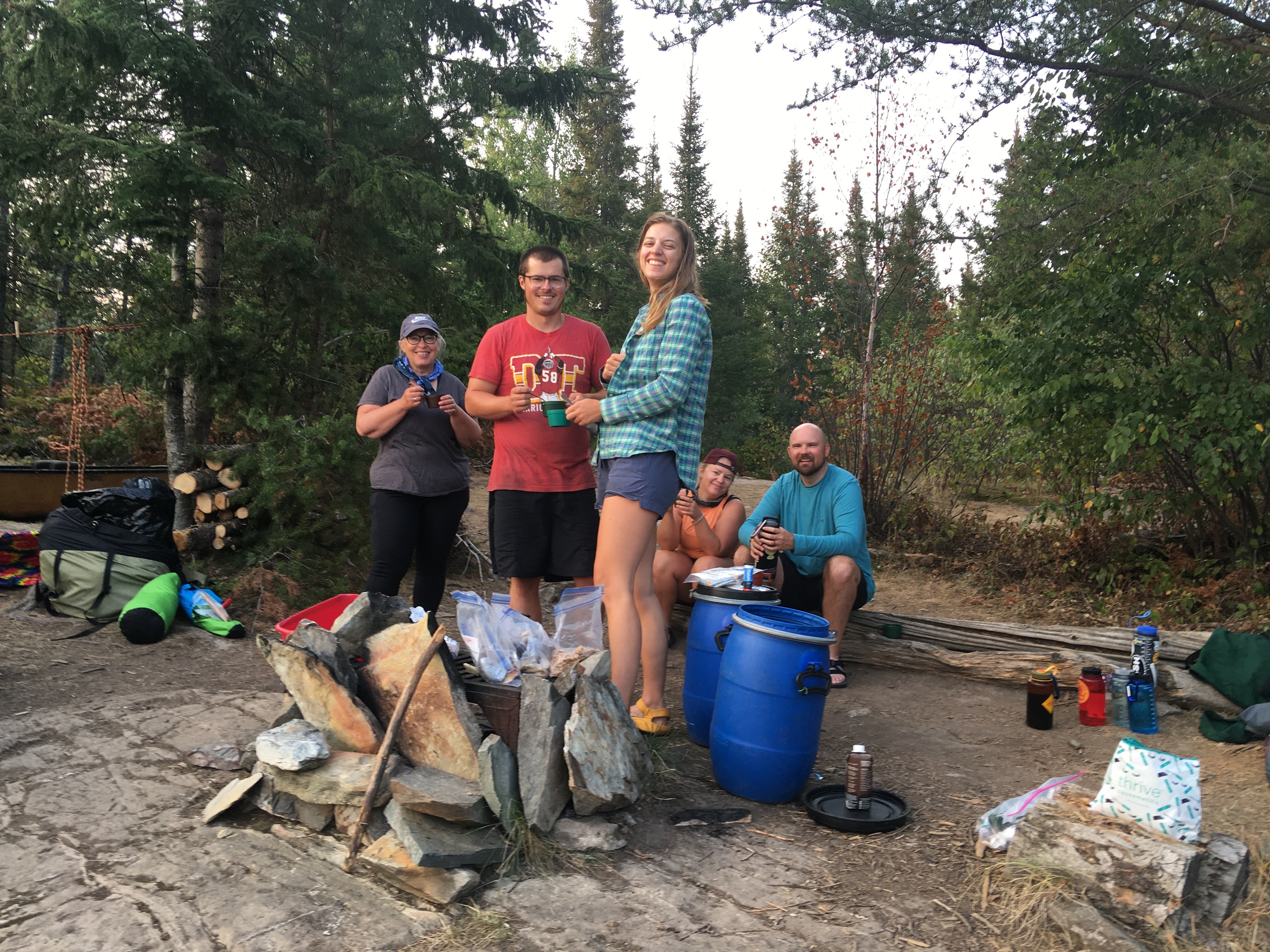
We fueled ourselves for the second 180-rod portage of our trip—we only had a short paddle from the campsite to the portage entrance. I was confident I could carry our pack like I did for the other portages—until I saw the steep, rocky incline of the trail—whooaa! Most of the others had already gone before me with their gear, so I used the paddles for climbing poles (not the best idea for paddles, but definitely useful) and slowly made my way up the rocks. The ascent continued. The trail peaked as we walked on huge boulders with crimson-colored wild blueberry bushes lining our path. A small clearing in the trees allowed Emily and I to see that we were at the highest elevation of our whole trip! We had climbed the ‘mountains’ that I had not wanted to portage up the day before! As we got closer to Ensign Lake, and the descent became steeper, Aaron came back to help after dropping his gear. I handed the pack off to him for the last leg.

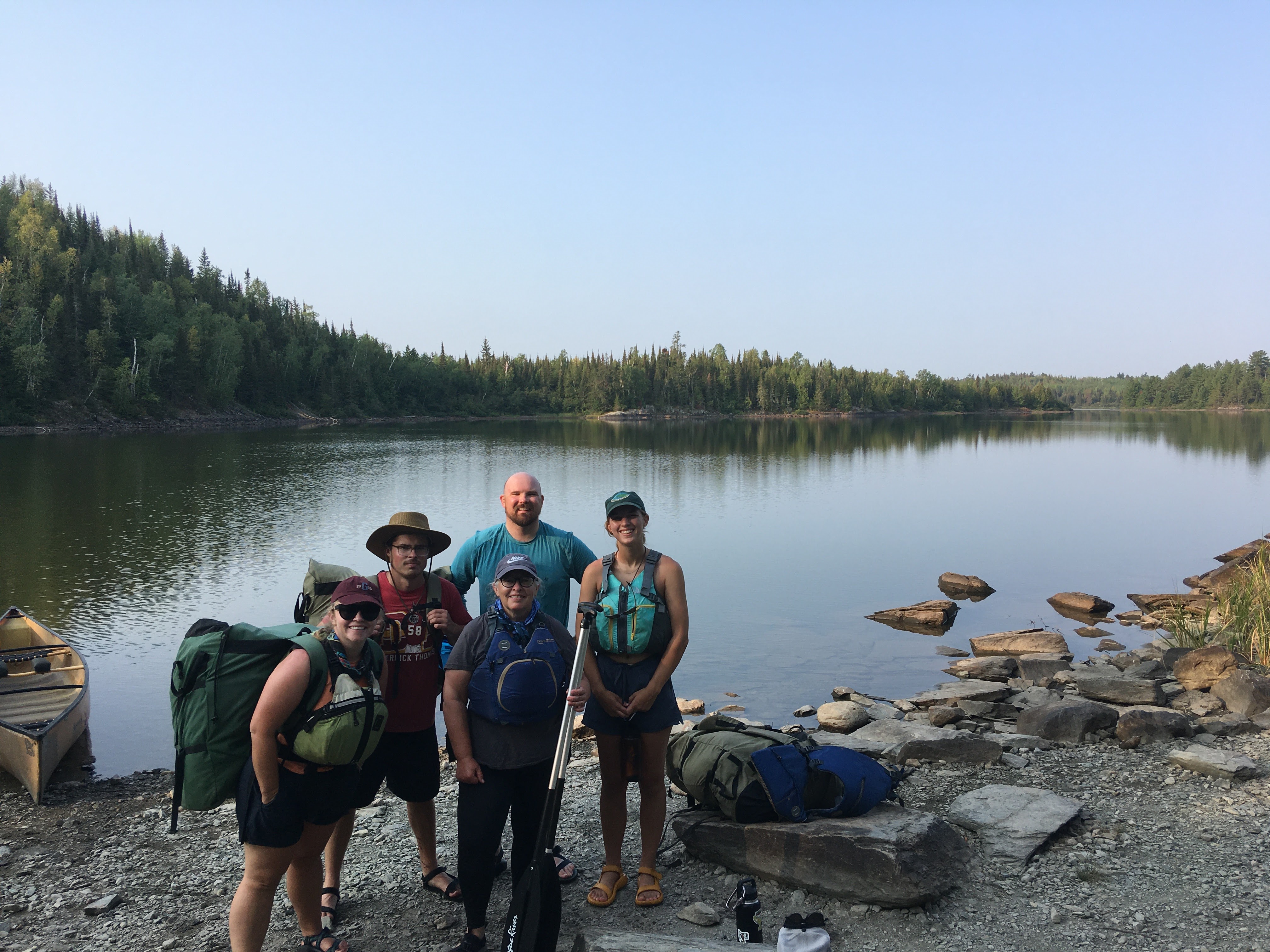
After our ‘hooray, we did it!’ moment, we paddled on around the huge island-like peninsula of Ensign Lake. We saw campsites with large tents and colorful shade cloths, unlike anything we had seen thus far. The kids fished as we paddled, and I noticed how Autumn had suddenly appeared in the northlands.

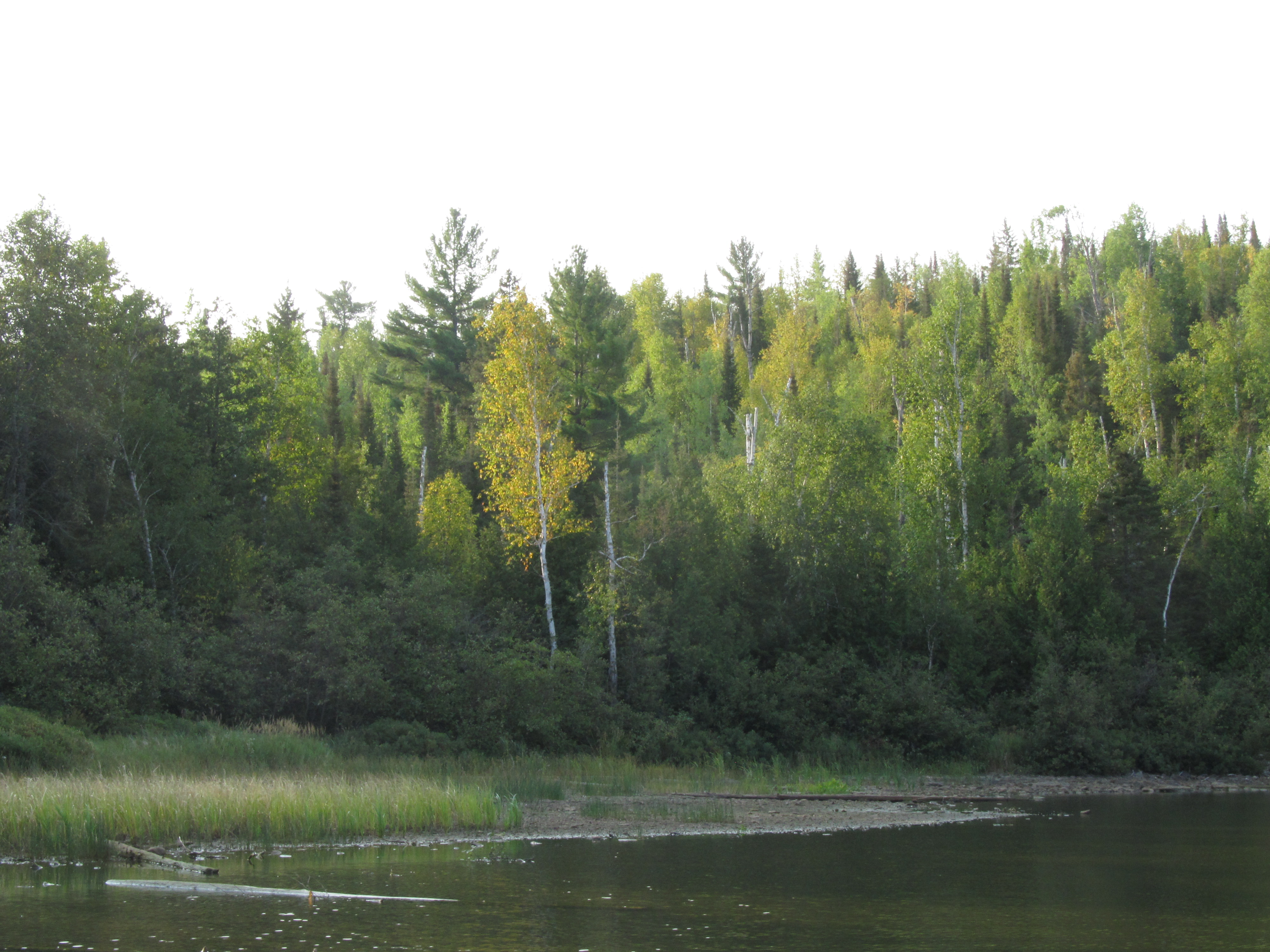
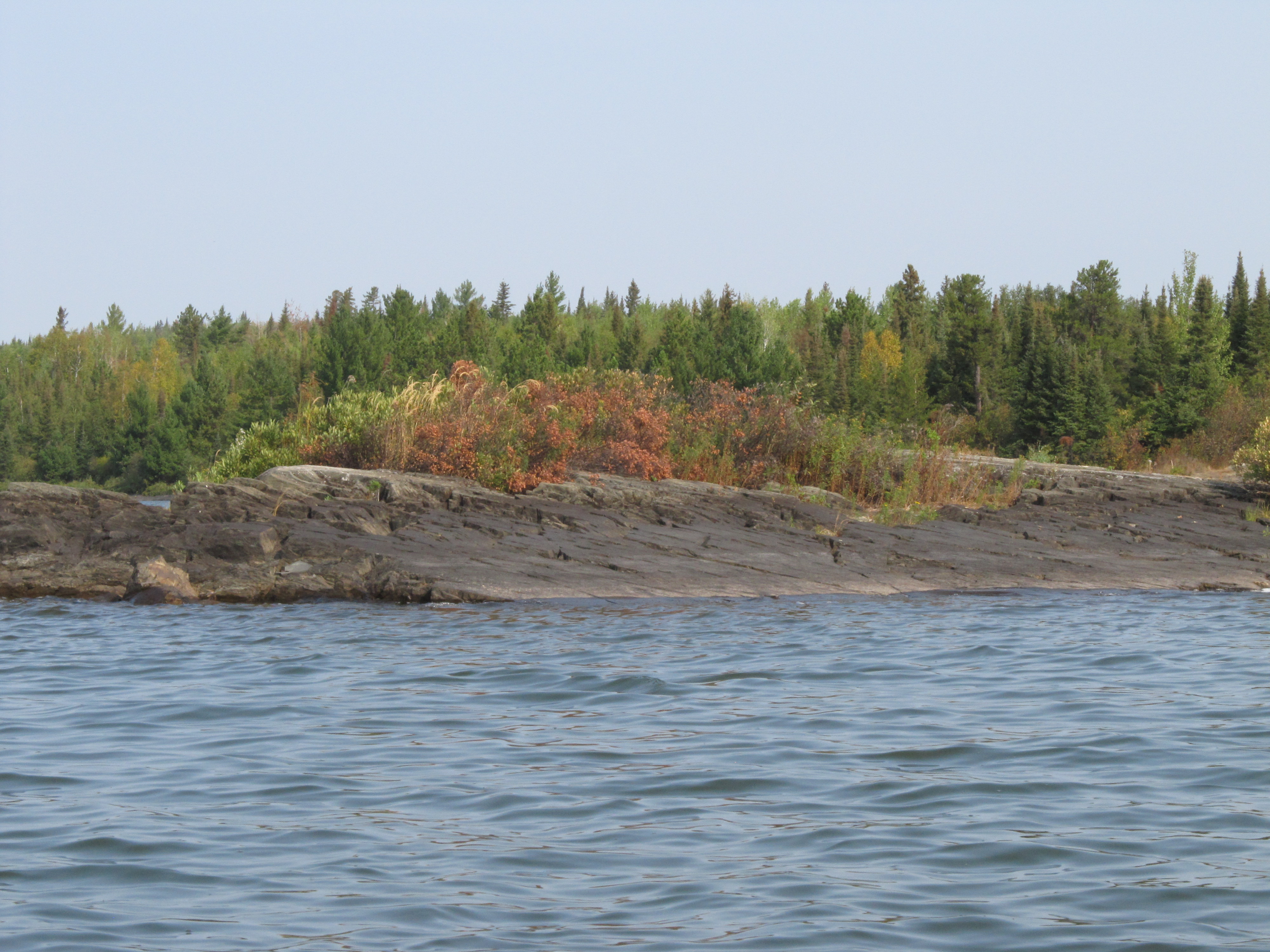
We found a campsite on a point across from an island that was close to the west side of Ensign—a perfect spot for our last night in the BWCA.
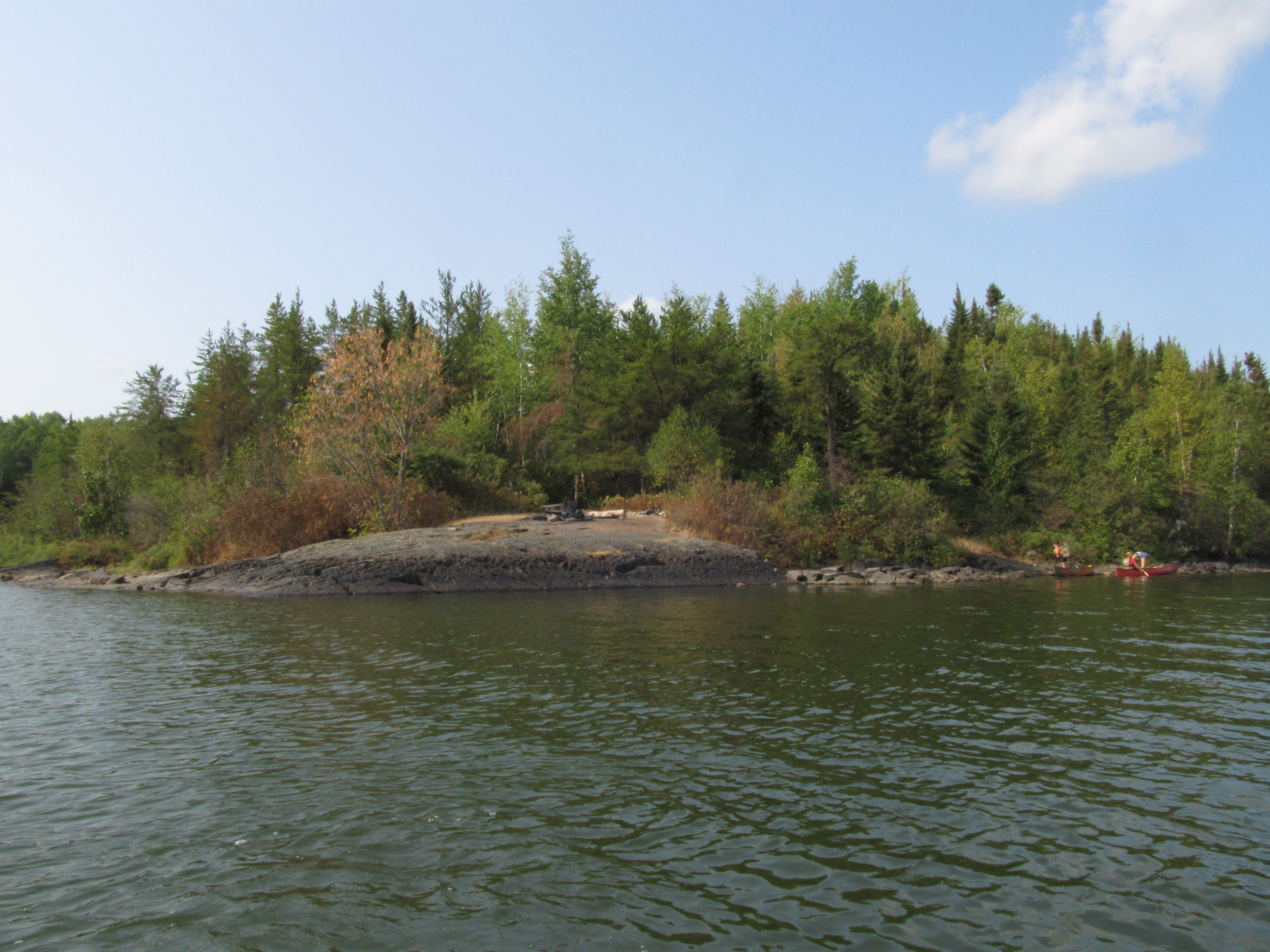
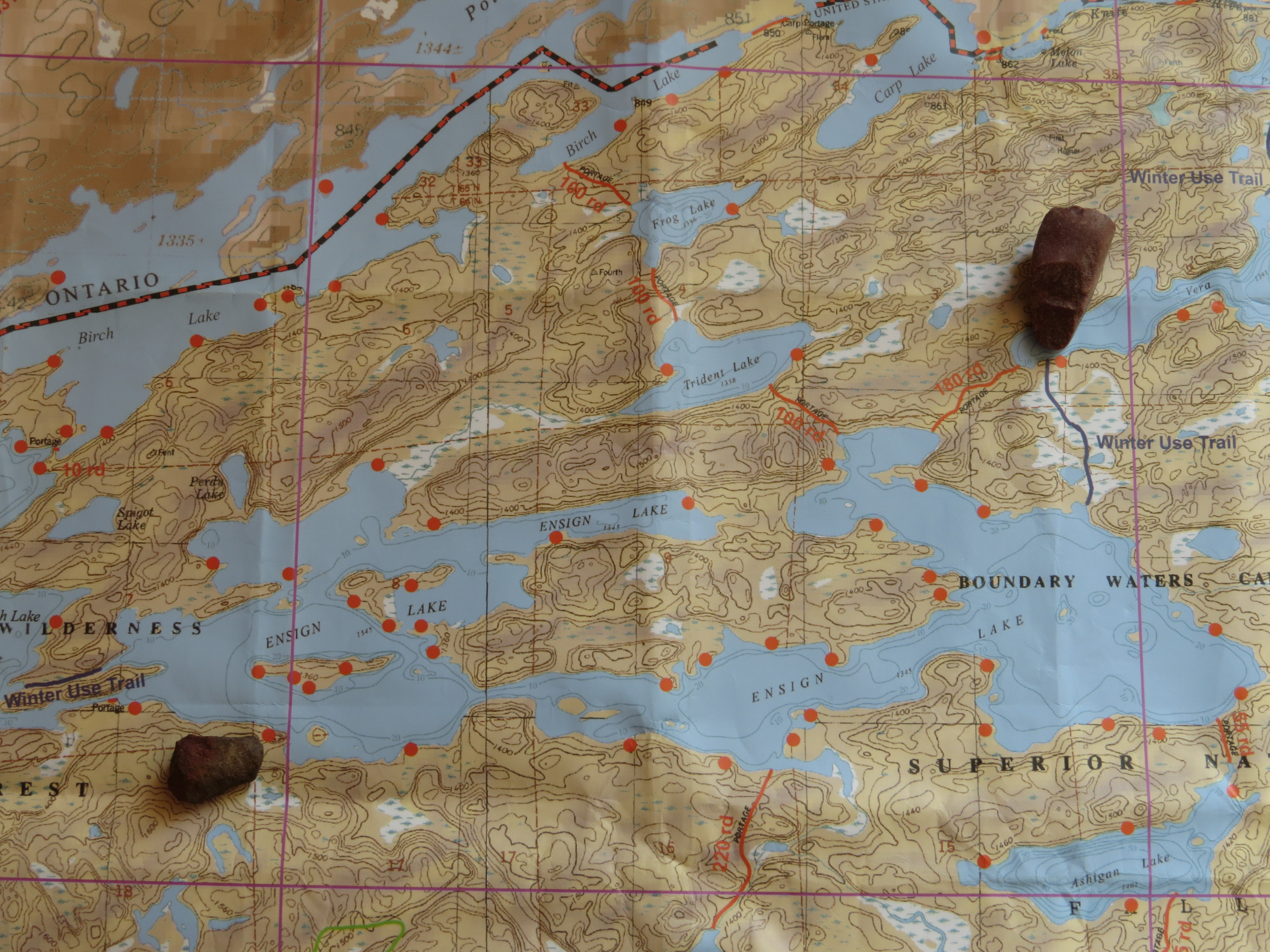
We unloaded, set up a shade tarp and hammock, and the activities began. Aaron and Shawn went fishing, Emily and Zoe went swimming, and I went exploring. There was a nice little cove made by the point and the island with lots of rocky shore to climb along. The rocks were amazing! Most of the point was a dark purplish-colored rock that looked almost like some kind of lava rock. When I got to a place where some had chipped away, I saw that it was Ely Greenstone, which is a metamorphic rock that began as basalt lava flows that gushed onto a cold sea floor 2.7 billion years ago. The green color is from a number of different green minerals that grew in the rock. Ancient Earth history under my feet.
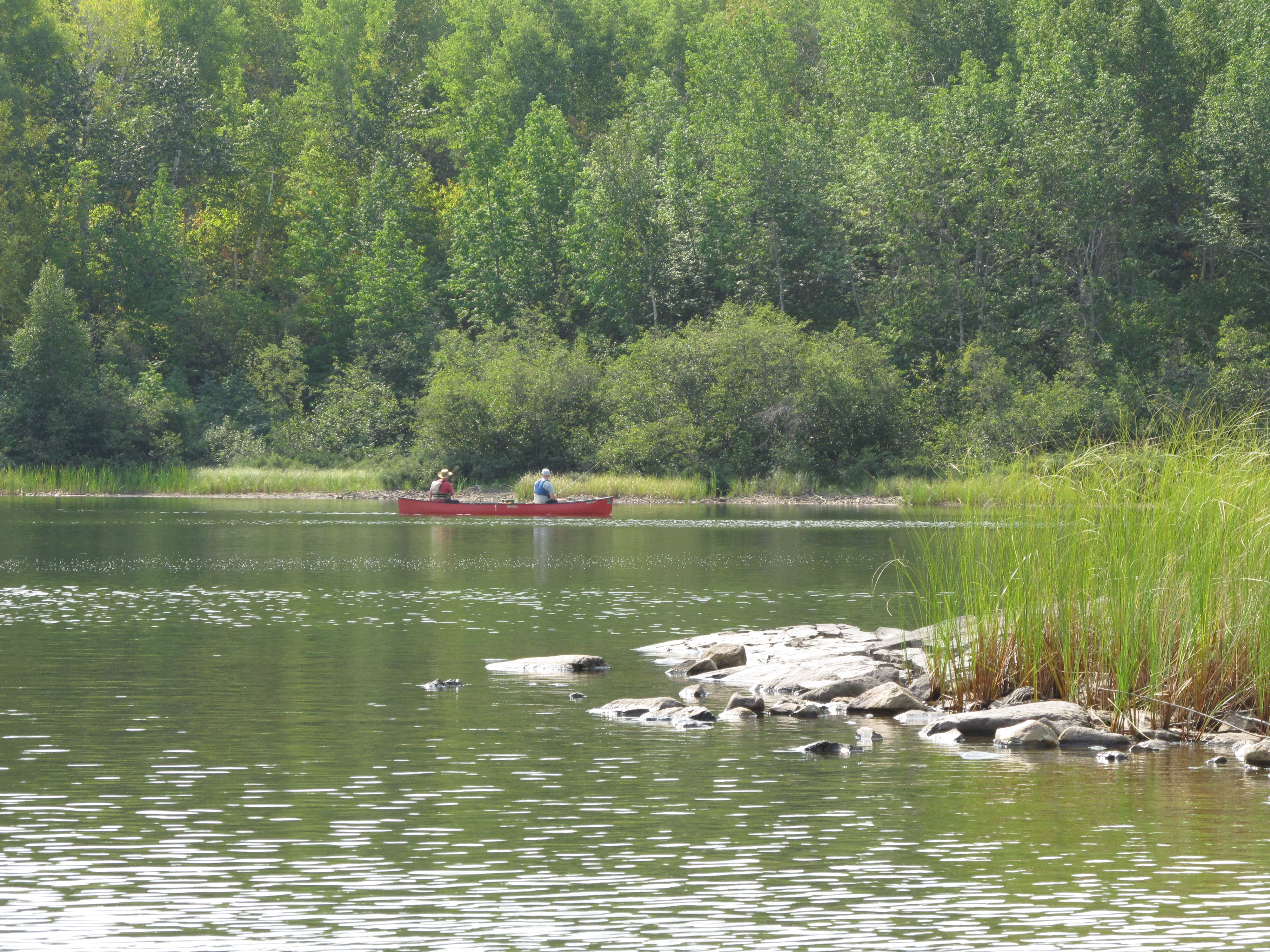





I moved away from the shore to climb boulders that buttressed the whole point of land, and from my vantage point, I saw where the cove met the land behind our campsite. That looks like a perfect place for moose, I thought, then saw the many tracks imprinted in the mud. But I could not tell what kind of animal made them.

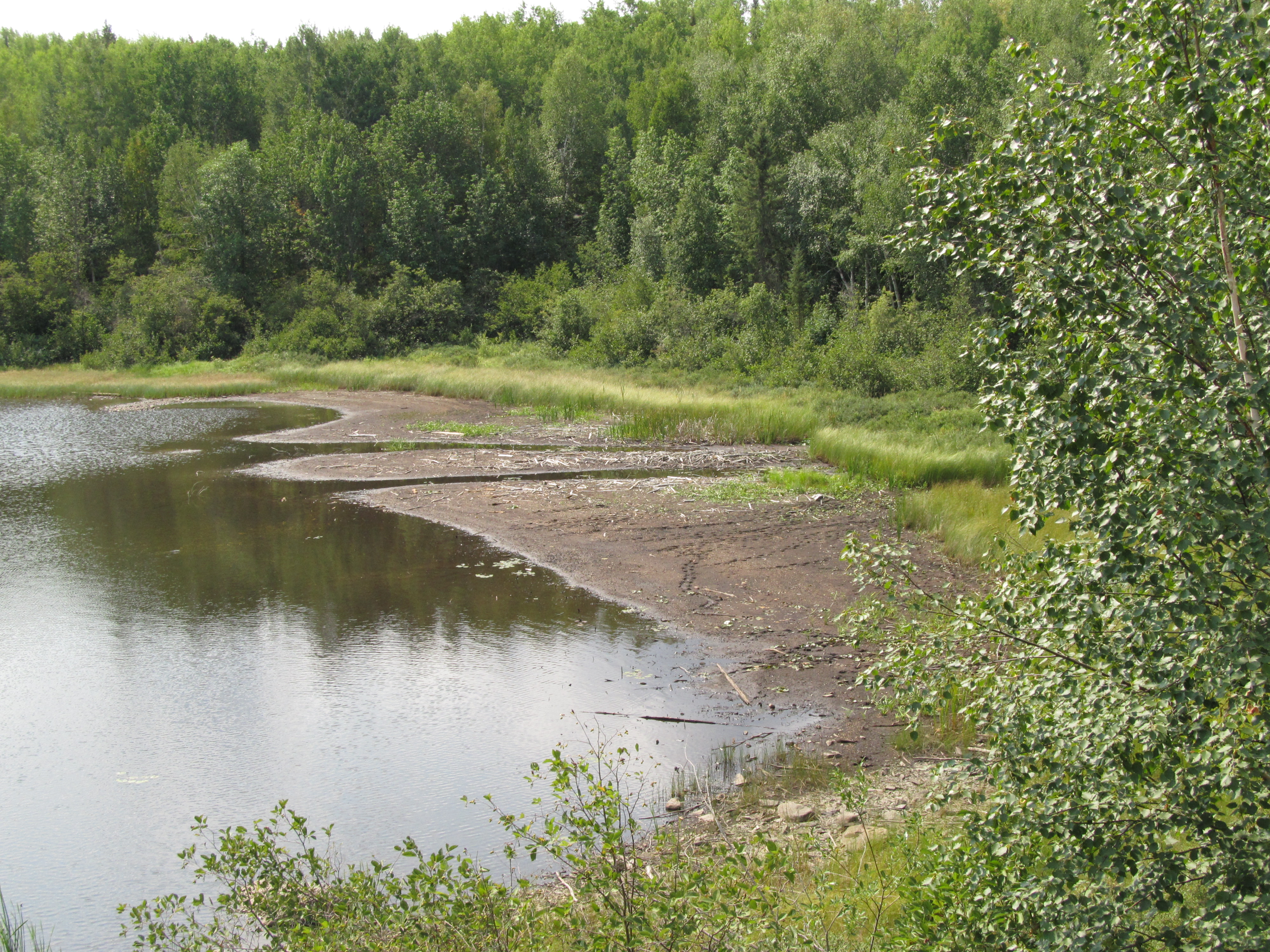

The rocky trail wound back to the campsite through dried ferns and the unusual wildflower called Fireweed. The intricate lavender flowers produce elongated seed pods that burst open to fluffy white down that carry the seed on the wind. The plant is so named as it is one of the first plants to grow after a wildfire.
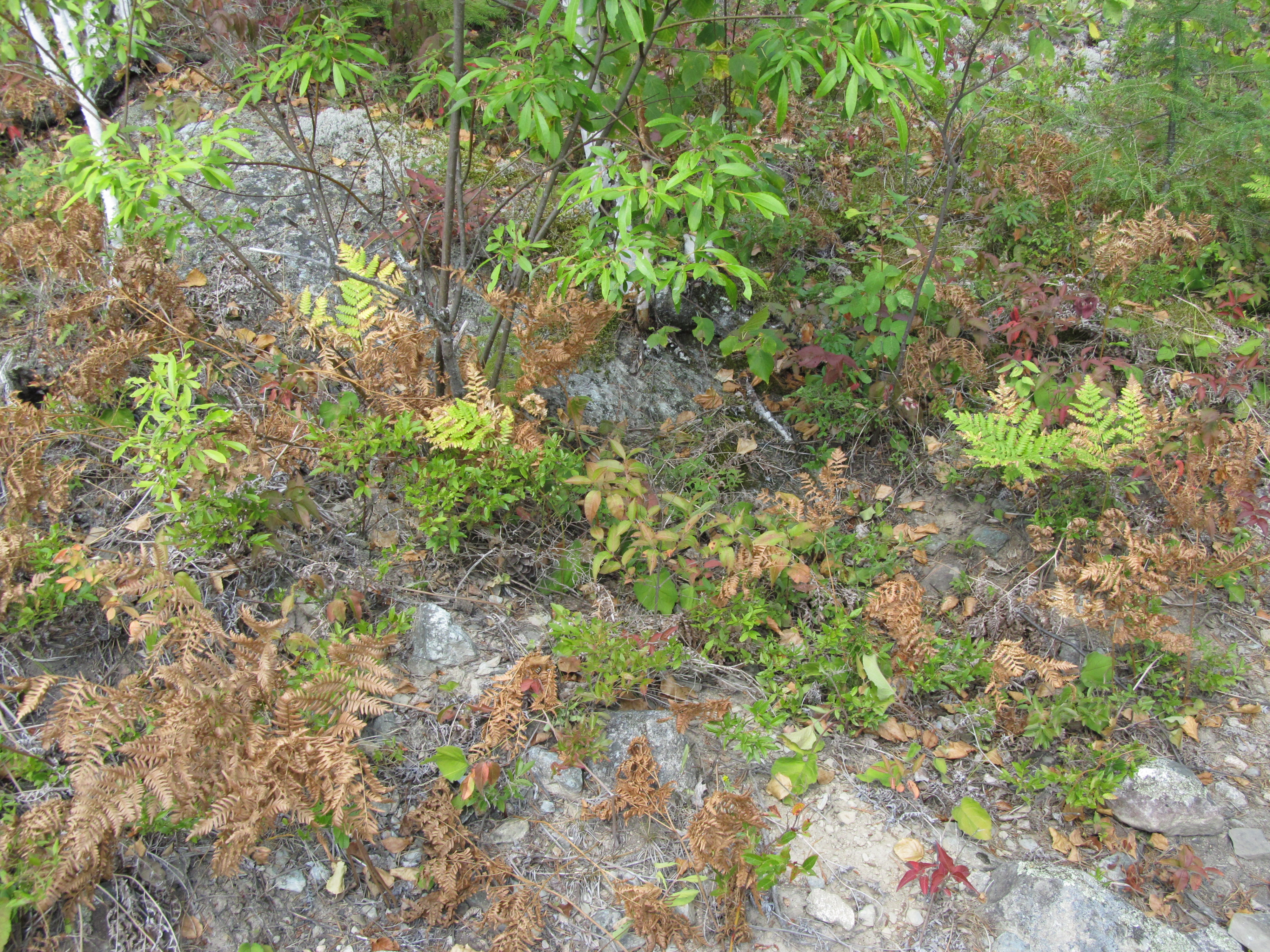


Emily had brought a little travel pack of watercolor paints to reignite her artistic talents that, like so many things in all our lives, had been put on the back burner of her daily life. She set up her painter’s table on a flat rock close to the water’s edge, and the two of us painted. While we were painting, we heard and saw fish jumping at the rock point so alerted Chris to that. Not long afterwards, Chris caught a nice Walleye that, along with a Northern Pike Aaron caught, became our supper.

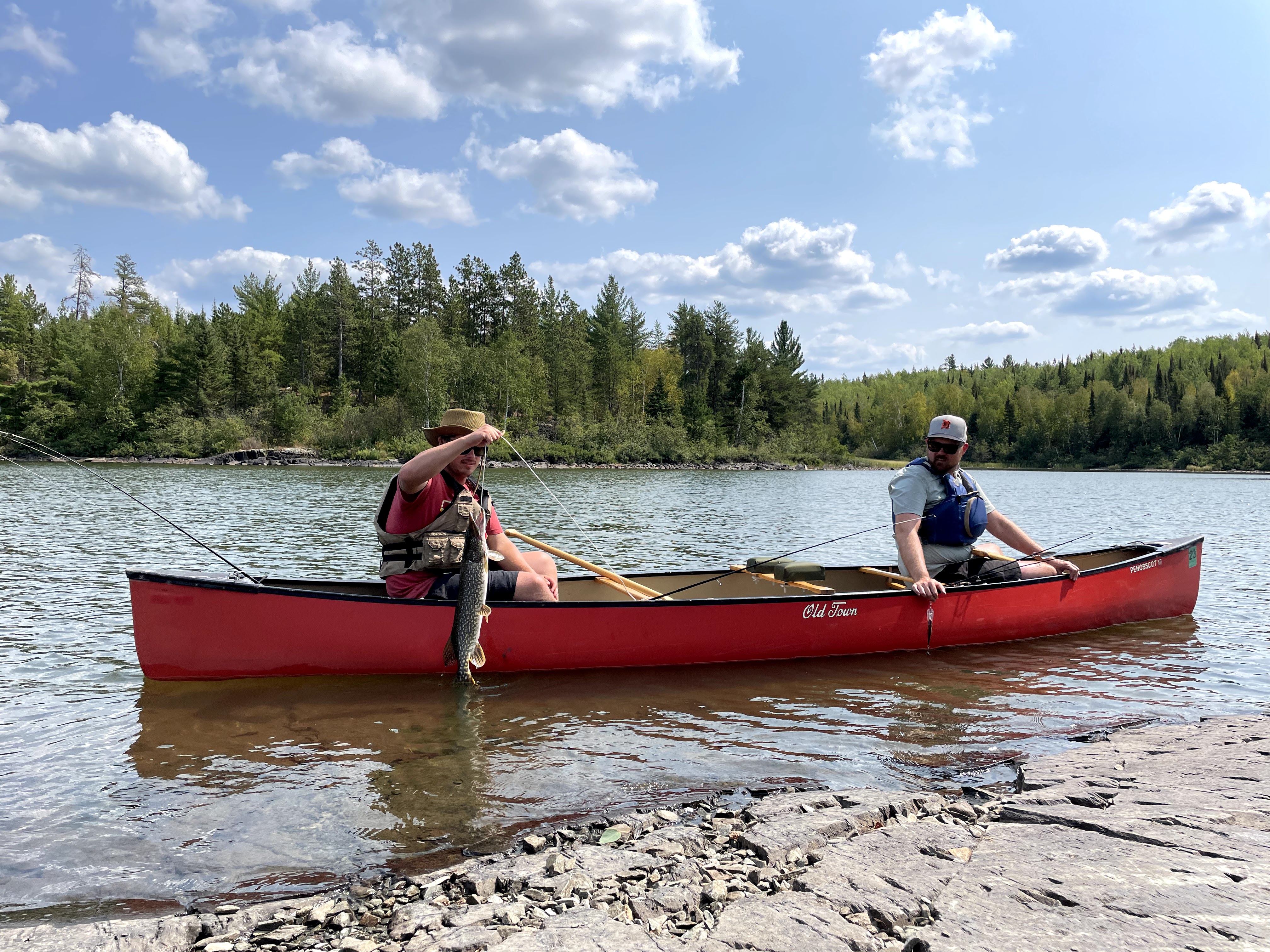
Our constant companions in camp were a trio of Ruffed Grouse—they scurried around on the trails and through the brush, not seeming to mind at all that we were there. They flew up four or five feet to ‘pick’ the red rose hips, a fruit packed with vitamin C.

I was still very curious about the tracks in the cove, so had Aaron take me there in the canoe, but I still couldn’t get close enough to see what made the tracks. So I trekked along the shore rocks again to the land side of the cove. The ground was squishy, but I walked on the sedge grass that grew between the mud and the forest. Then I was close enough to see…the moose tracks…

…and the bear tracks…and the wolf tracks! The big three of the Northwoods had pushed pathways through the shrubs and sedge grass to get to the water’s edge. Here was evidence of the reason we protect our food in bear barrels hung in trees.
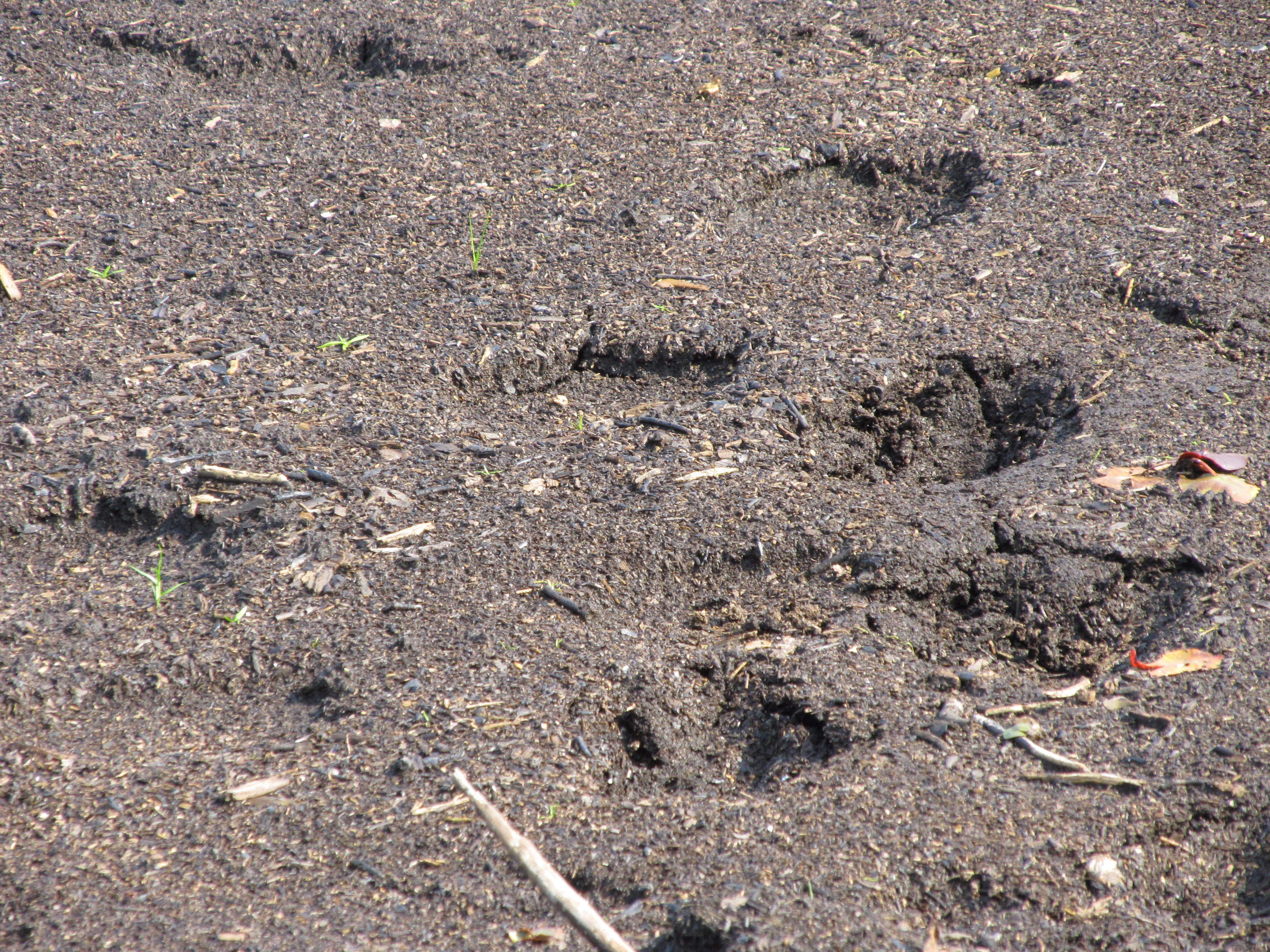

When I returned to the campsite, Chris was talking to a man and a woman who had pulled their canoe up to the shore. They explained they had dropped their water filter in a lake and needed water. As they talked, the woman filtered lake water into their Nalgenes from one of our filter bags. Filtering water is a necessary and sometime tedious job that someone has to do multiple times a day, especially in the heat that we experienced in our week there. The small bags can be filled, the filter screwed on, then squeezed to filter the water directly into Nalgene bottles. The big bag (with filter) can be hung from a branch or rope to let gravity slowly do the work. The experienced Canadian travelers were grateful for the water, and talked about their troubles of finding campsites on their trip also.
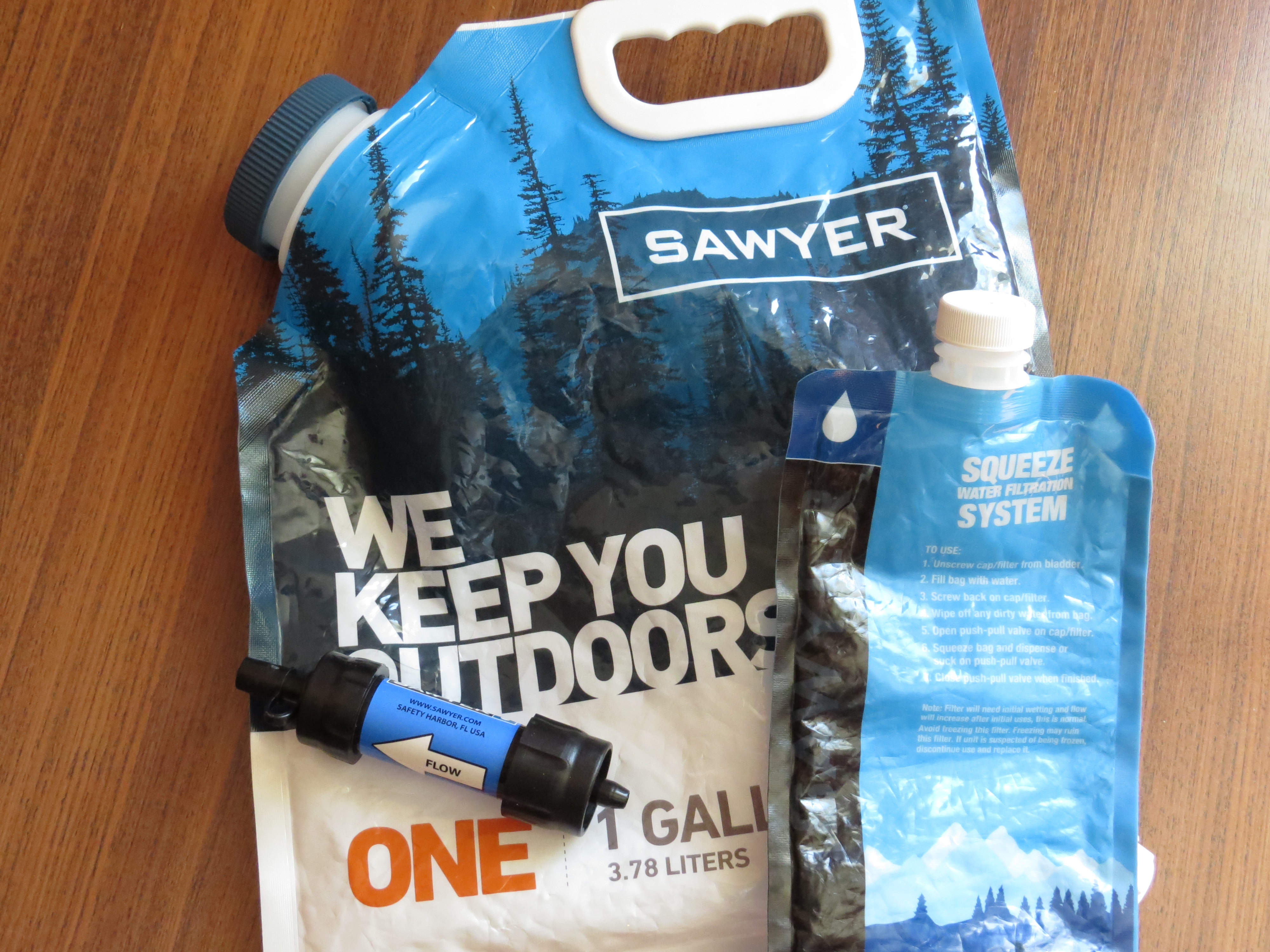
Aaron and Chris filleted the fish, and Aaron cooked it over the small camp stove—it was so good! As evening arrived, we set up tents, hung the bear barrels, and I took one last hike to the boulder look-out to see if any of the big three had come to the water. I saw lichen-covered rocks and Aaron and Zoe fishing, but that was it.
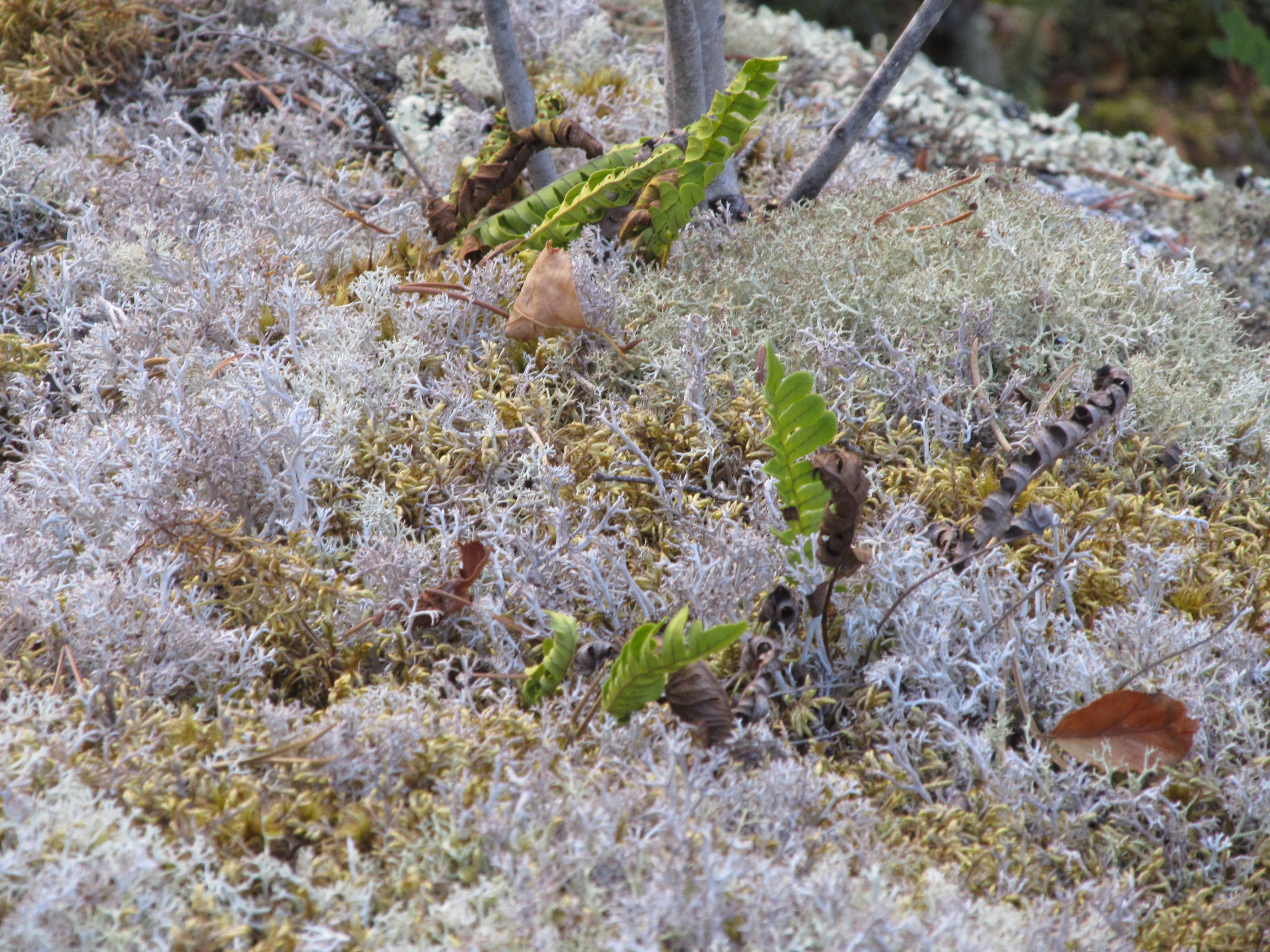

Shawn was fishing from the shore as the sun set and the moon ascended above the trees and reflected its reflected light onto the water. Another peaceful evening.
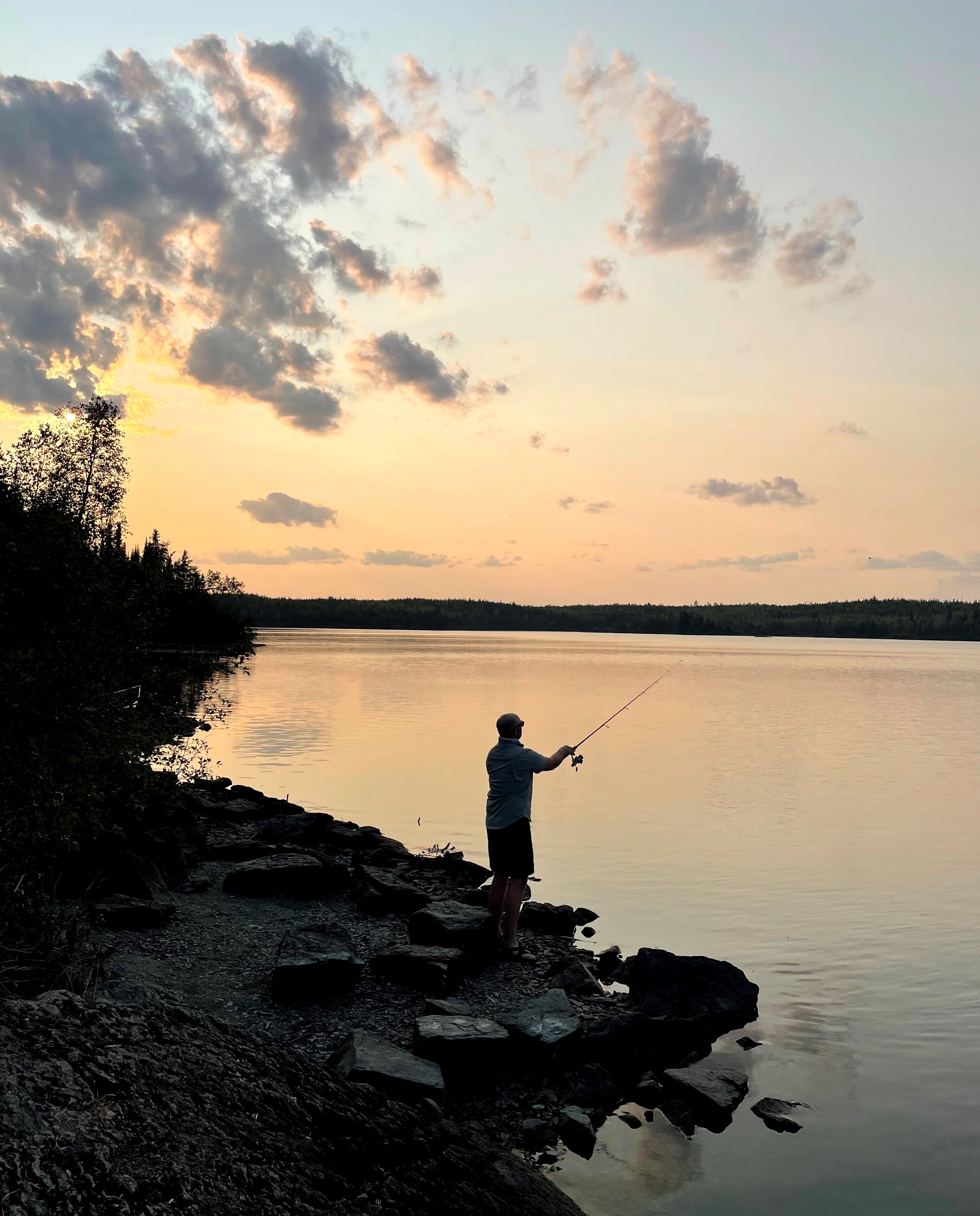
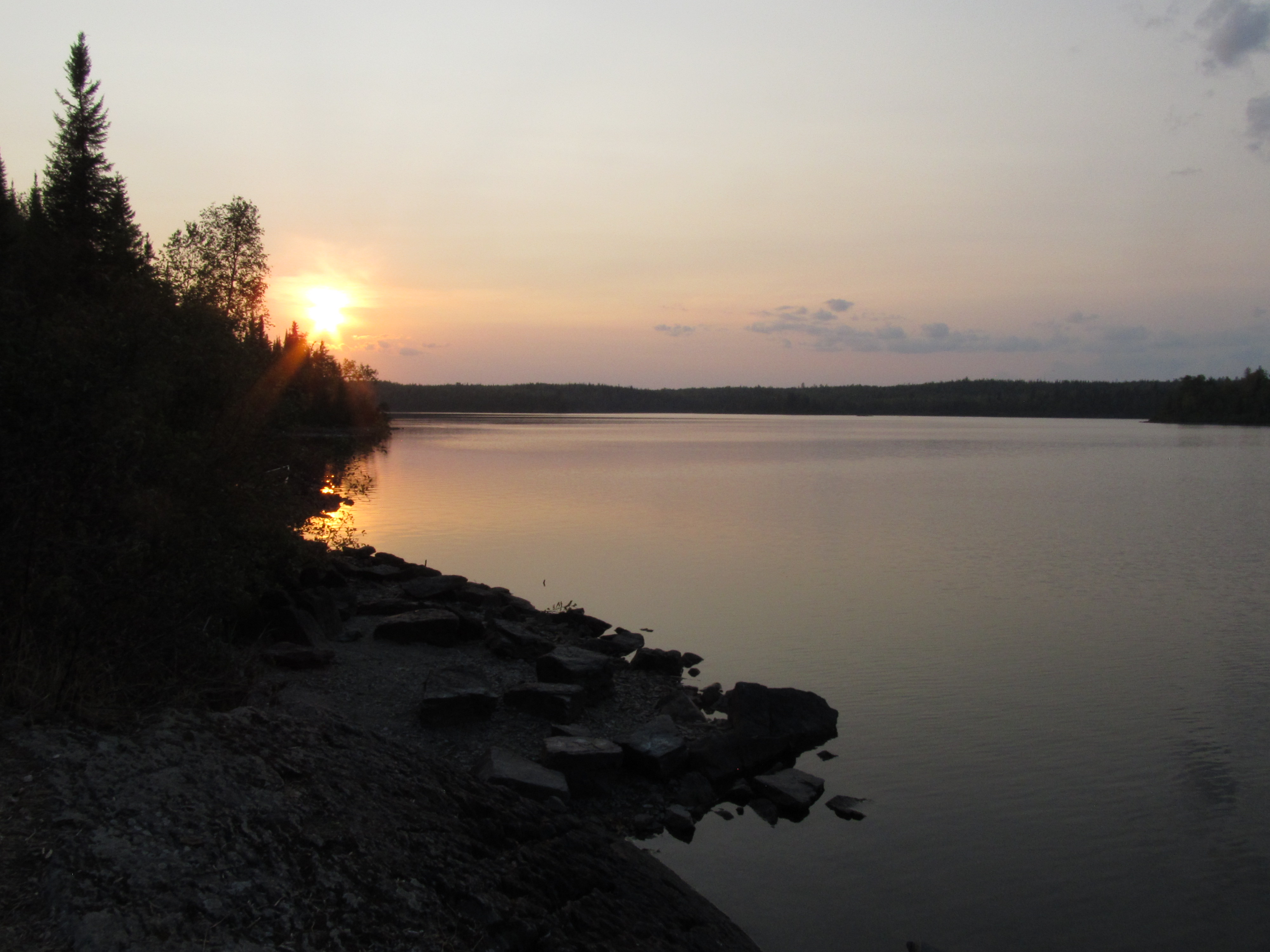
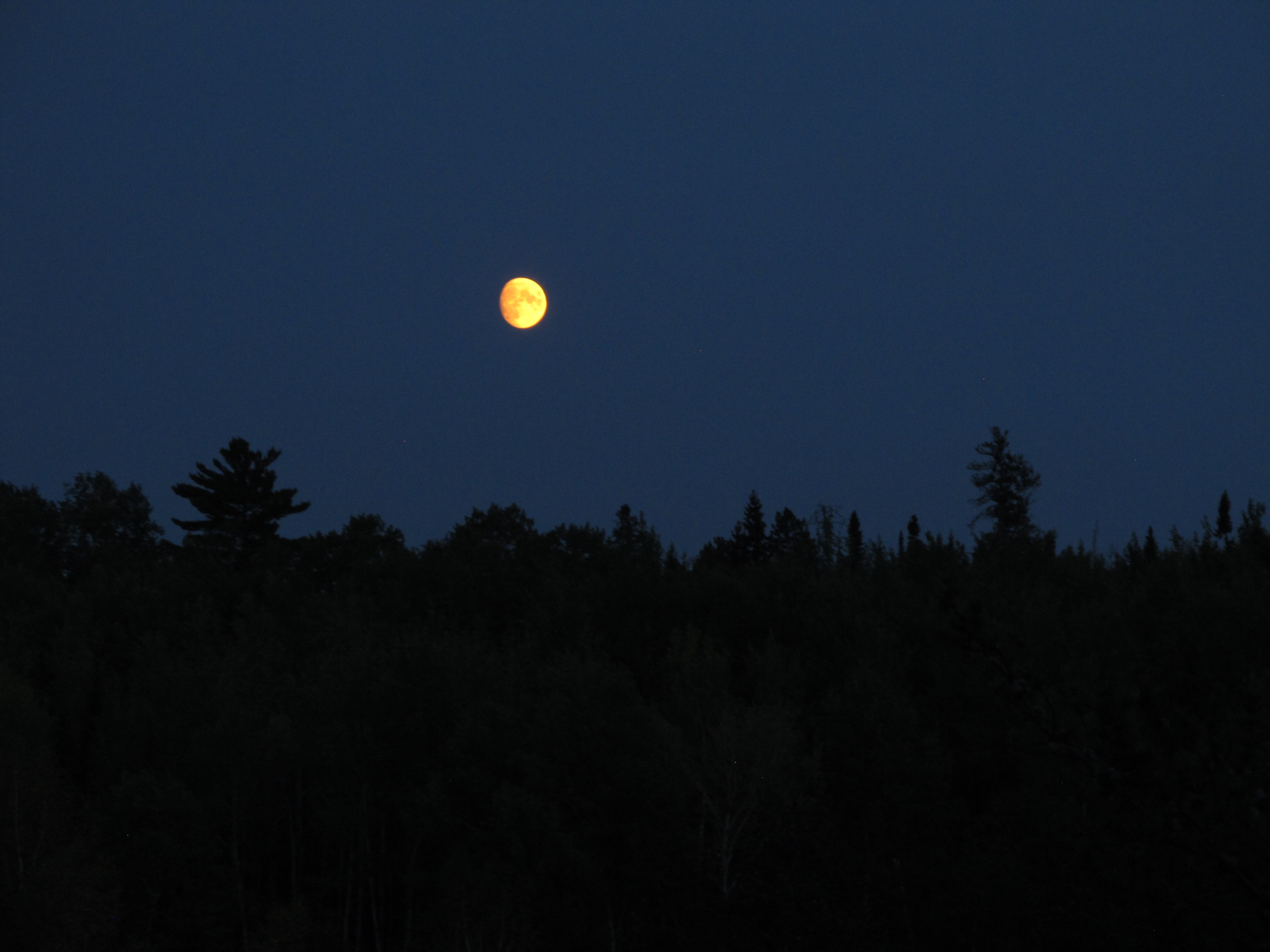
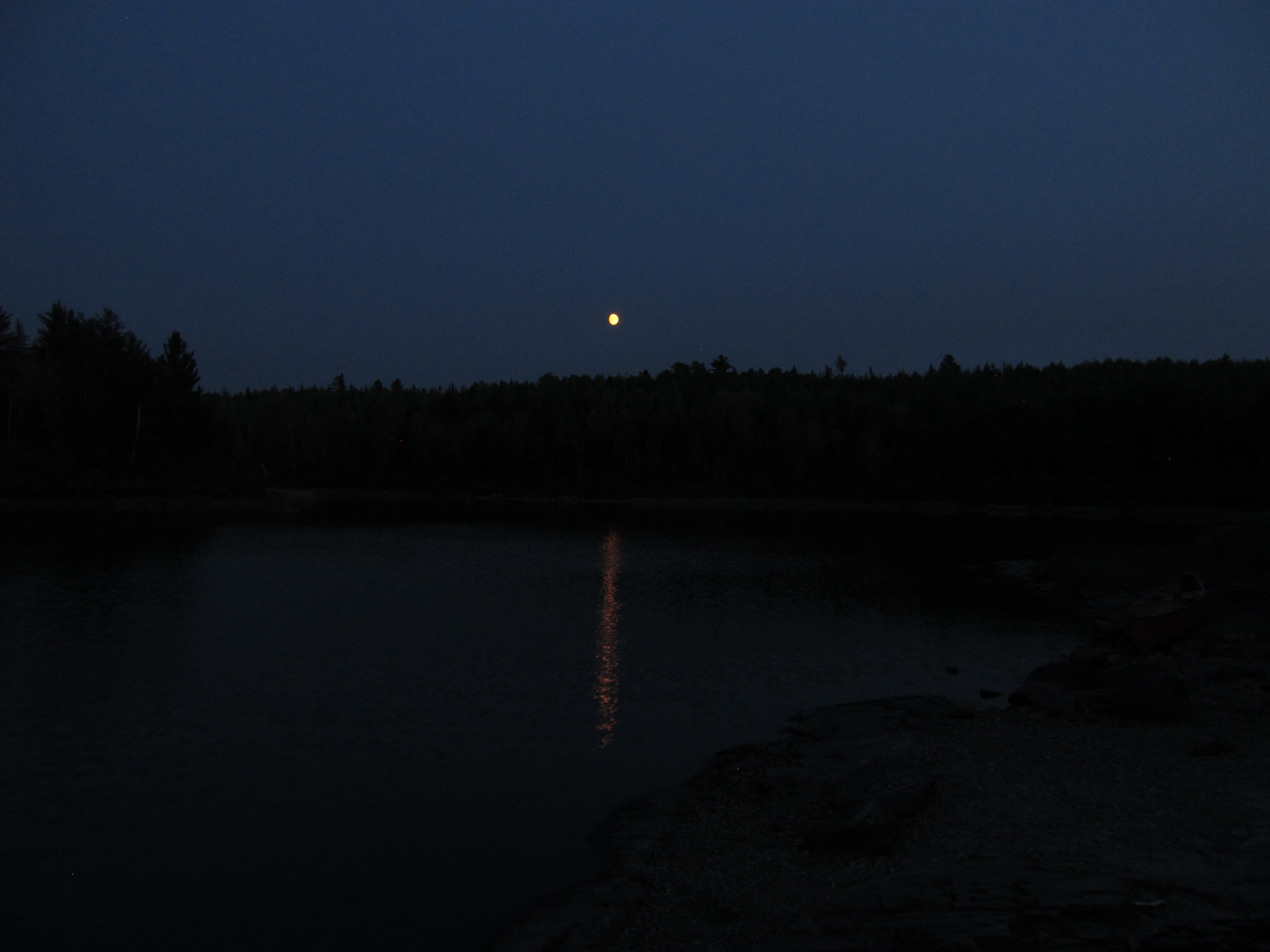
Day #4 was a wonderful day! My paddle-down-head-down moments were minimal as we left Vera Lake. I had made such progress since my Tuesday morning breakdown. The portage was surprising to me—coming up to it, I couldn’t see that it would be such a steep climb. But once again, our choice wasn’t even a choice—we just did it. I’m not even sure why I was so scared of portaging ‘the mountain’ the day before, but I guess it was my lack of confidence in myself. So the blueberry-bush-lined portage was another big deal for me—I ascended the ‘mountain’ and rose in confidence. I loved our downtime at the campsite with painting, scaling boulders, eating fish, being with grouse, and, of course, seeing the tracks of the big three of the North (if only I could have seen the animals from my boulder lookout!) I was already getting kind of sad that the next day would be our last—just when I was really getting the hang of all of this! But each day, each breakdown, each resolve, each portage, and each challenge lifted me to a better place.
This is the fourth post in a series of five that chronicles my experience of five days in the Boundary Waters Canoe Area (BWCA). It is best to read the whole series from the beginning (Anticipation) in order to understand certain things I refer to in my other posts.
Challenge
The quiet, still mornings in the Boundary Waters are the epitome of peacefulness. We don’t realize how noisy our normal world is until we experience the wilderness. Despite another night of not sleeping well (I found myself rolling downhill off my sleeping pad), the dawn light and smooth water soothed my morning fatigue and rejuvenated my spirit. After our difficult day #2 that had little time for fishing, Aaron rose with the sun and launched the canoe to glide on the glassy water of Dix Lake and entice some fish. The mirror reflection of the shore trees and rocks is a little disorienting—the ‘real’ world doubles in illusion.
Aaron had a couple of bites, and he discovered some other early morning adventurers. He saw a mama otter swimming with her two young ones. Otters are such excellent swimmers—graceful, playful, and skilled. When Aaron got too close to them in the water, they popped up onto shore, and mama hissed at him to stay away from her babies. They then disappeared into the woods but reappeared in the water farther down the shore.


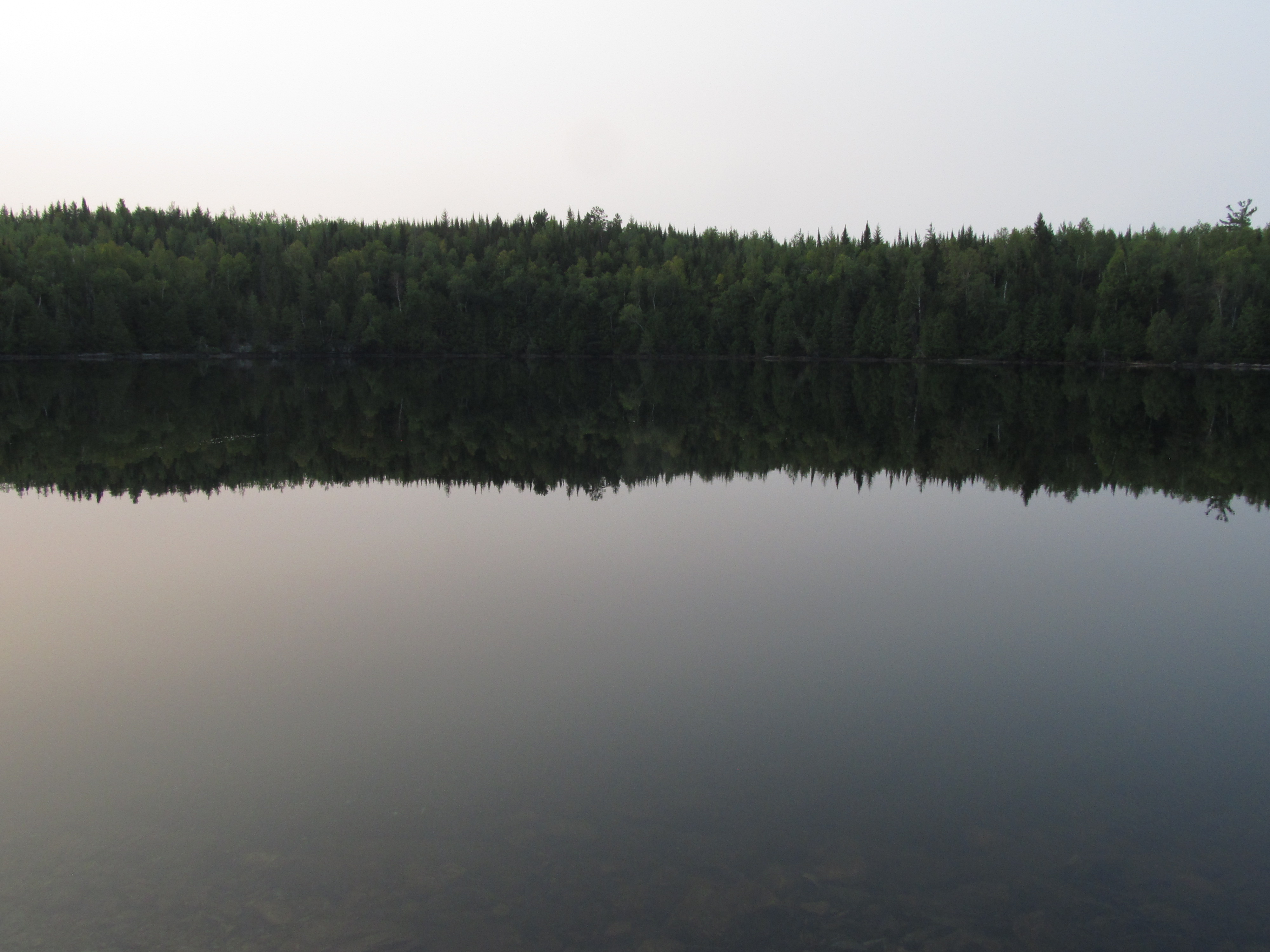
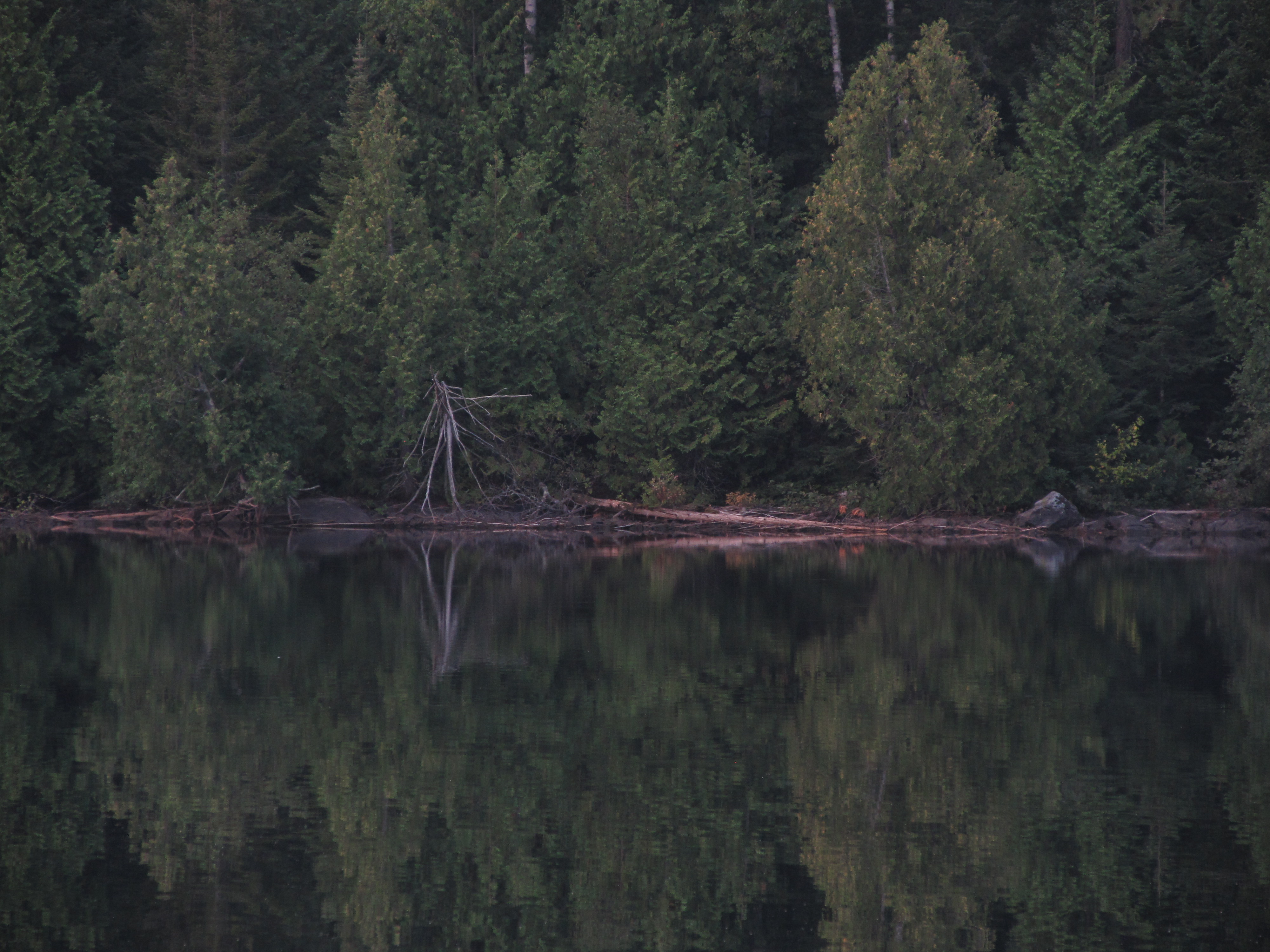
After the previous challenging day of finding a campsite and lacking any desire to stay in the cramped site that saved us the night before, we got an early start. We ate a quick oatmeal breakfast, then packed up and pushed off. I wish I could say my reckoning from the day before had eliminated my morning paddling struggles, but I had my fair share of paddle-down-head-down moments. But it was better than the previous two days, so progress is good in my book. We had a short 30-rod portage into Skoota Lake, then prepared our heads (okay, I did) for our longest-yet portage of 180 rods (a little over half a mile). It was a challenge I was ready to accept! I carried my pack and paddles up and down the rocky terrain—another milestone for me to check off. After our portage, we were rewarded by one of the most beautiful lakes we paddled through—Missionary Lake. The pictures don’t do it justice!


Another short portage brought us to Trader Lake, a smaller lake with no campsites. We paddled around a large peninsula looking for the next portage. All I could see were steep hills, and I commented I didn’t want to portage up those ‘mountains!’ The trail makers had chosen wisely though, in a place that went between the steepest elevation with only a rocky descent into Vera Lake. Our smooth portages continued with us getting all our gear in one trip and with the kids carrying packs and canoes.
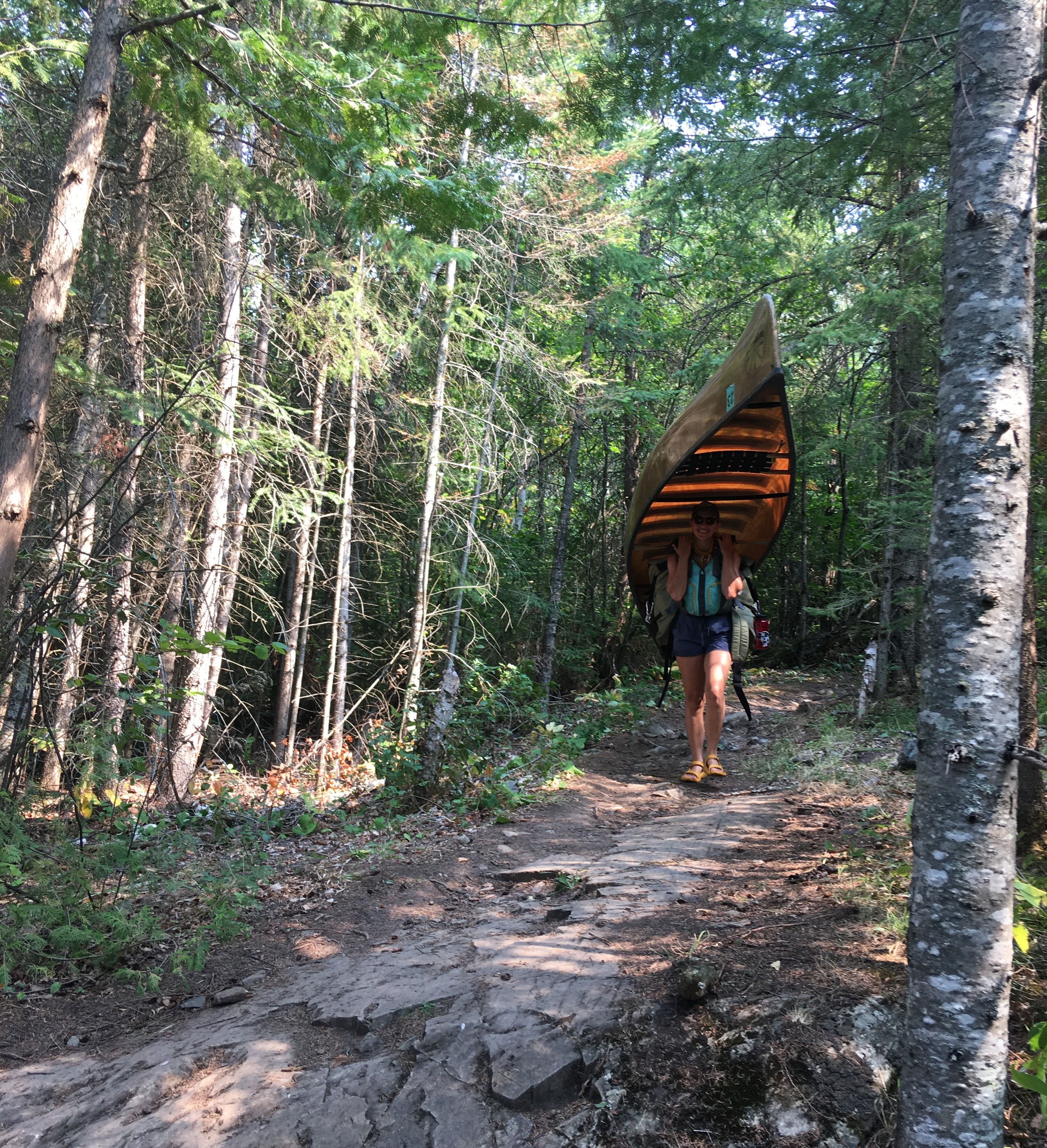

It was a hot, hazy day, but with our early start we progressed through five lakes and four portages and found the last campsite on Vera was open! And it was only mid-morning! We were going to have a much more relaxing day than the day before! Our campsite was large; our tents were scattered out so that no snoring, talking in our sleep (a-hmm, like the previous night), or zzzipping the tents open and closed would disturb the others. The animals of our campsite were lots of chipmunks who bravely skittered around in the hopes of food crumbs (and climbed over Emily’s shoulders), Ruffed Grouse who made funny little ‘talking’ sounds, and of course, the Loon of the Lake who crooned us to sleep at night.




Paddling, portaging, and sleeping were not my only challenges of the week. I like to have things…clean. While I absolutely love being outside and embrace being ‘in the dirt’ in the garden and flower beds, food preparation is another story. The first time we stopped for lunch (and every meal since) when I saw all the bags of food being put down in the dirt around the bear barrels, I had a physical reaction. I wanted to pick them up and put them on….something. By the second night I was heralding the presence of a large, flat rock beside the fire grate—“We have a table!” But once again, the kids were the pros at this, despite working in the dirt. I never bit into a ‘gritty’ piece of food, I never had to brush dirt off anything I was eating, and really, I just had to ‘get over it’ a bit, because ‘when in the Boundary Waters…!’ Washing the dishes was another area where I needed to ‘loosen up.’ We didn’t have the time (at times) or the energy (at times) to heat water and wash them in hot water with camp suds. So I turned a blind eye towards that after a while (and survived.)
Another aspect of BWCA wilderness life is the latrine. From the campsite, there is a path that wanders into the woods until you reach the latrine. It is an open-air bathroom, the most primitive of outhouses. So the system of the latrine is a ‘toilet’ bag with rolls of paper to get everyone through the week and some hand sanitizer that is placed at the beginning of the latrine trail. If the bag is there, nobody is at the latrine, so pick up the bag and take it with you. If no bag, wait until the person comes back. Simple.

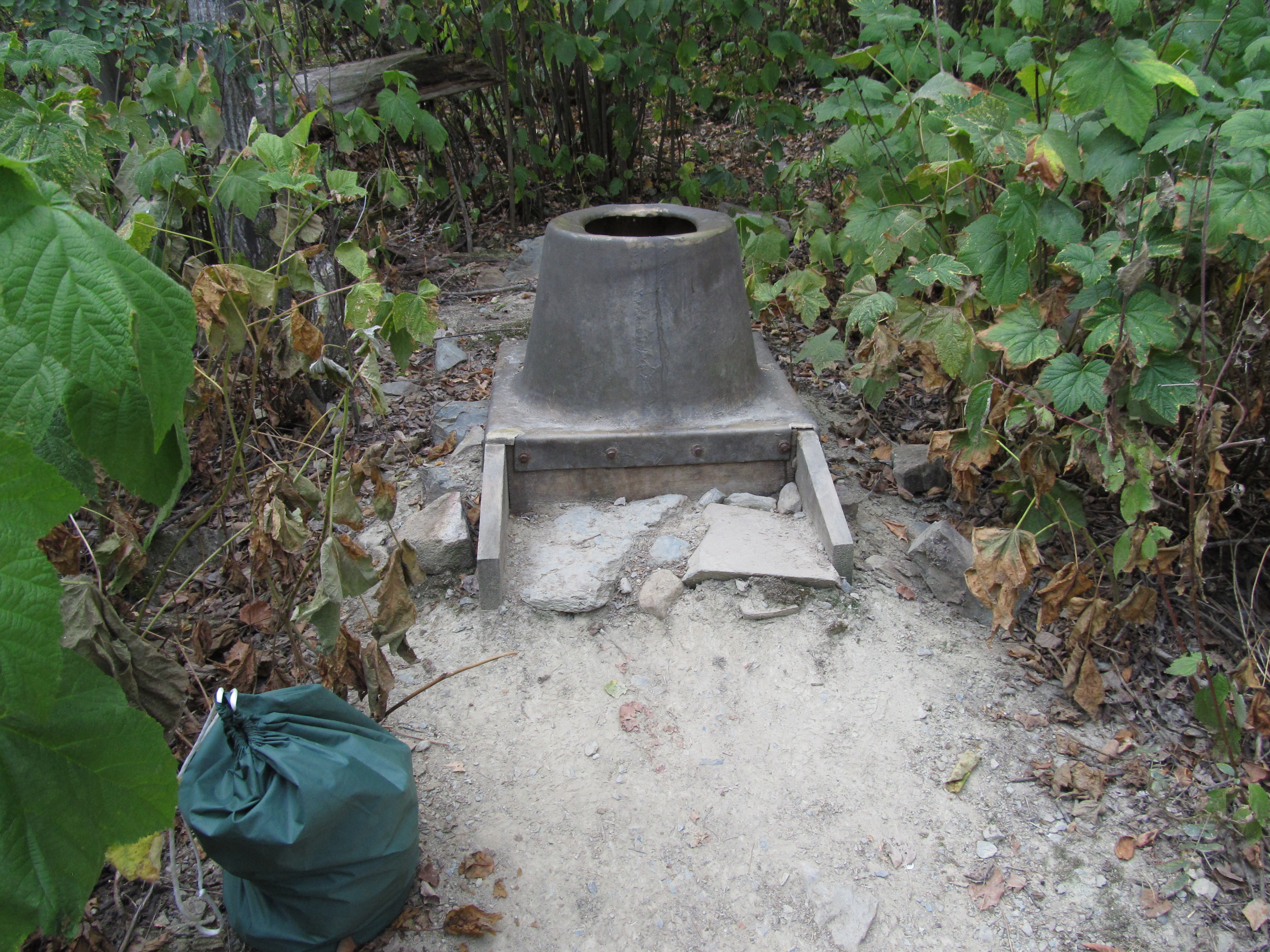
So much of the ‘land’ in northern Minnesota is actually just rock, and many of the campsites are positioned on large outcroppings that jut into the lakes. This huge boulder was unusual with its lines of white quartz, like ancient artwork preserved for our modern eyes.

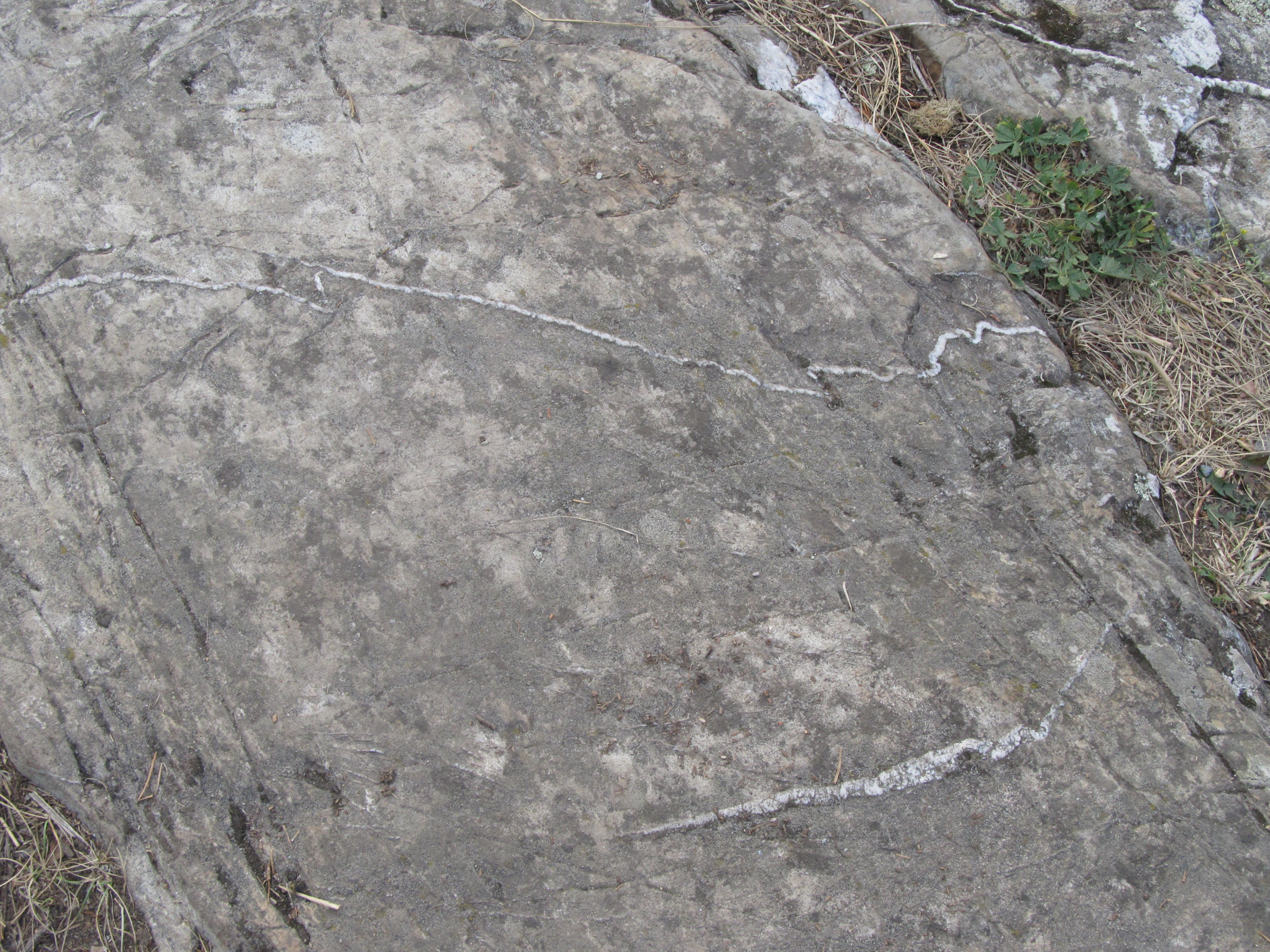
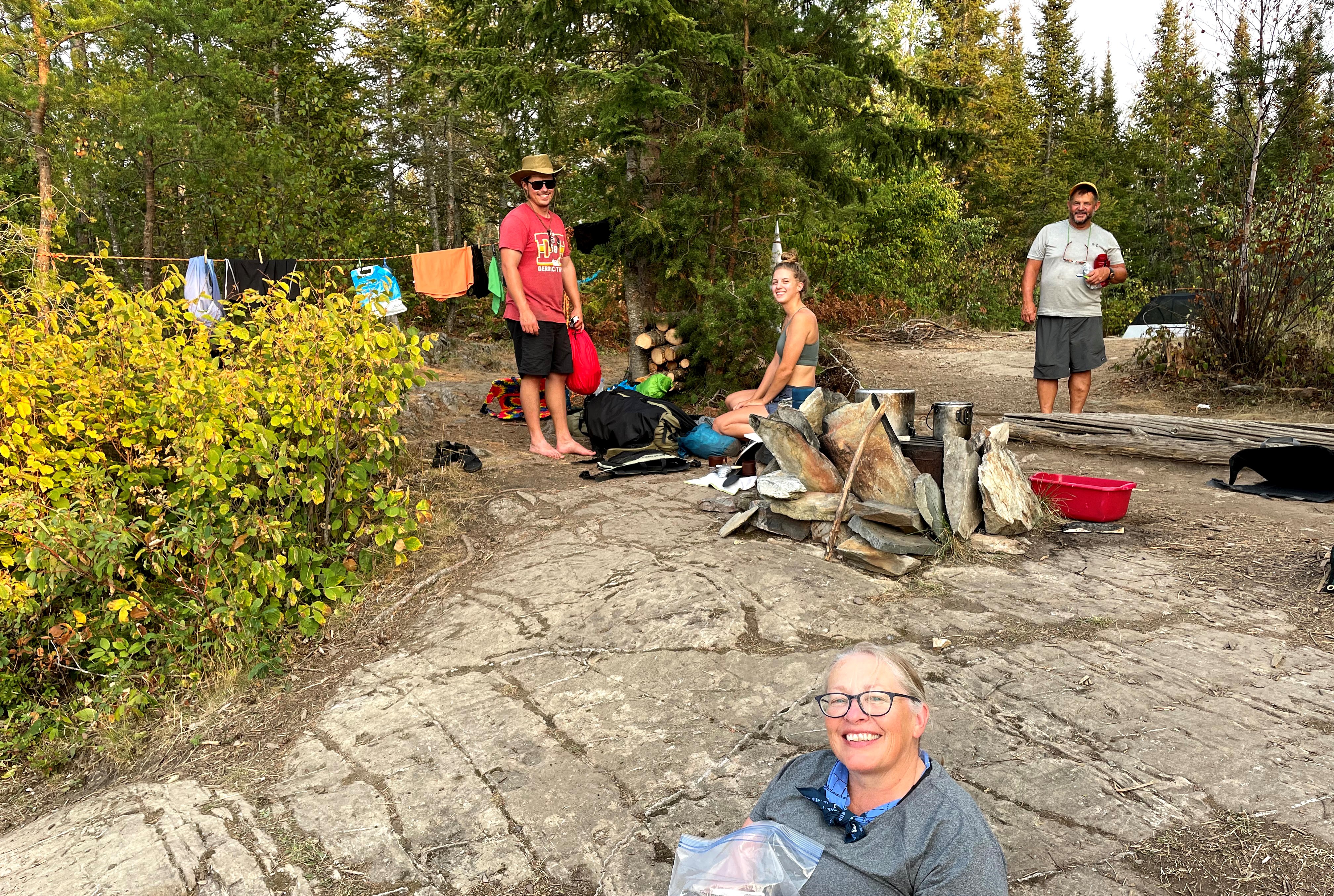
In the heat of the day, I waded into the cool, refreshing water to where I could still stand and ungracefully dog-paddled to and fro (unlike the otters)—it was my first ‘swimming’ adventure in nearly three decades. The fishermen fished, some napped, some read, and we watched canoers pass by looking for an open campsite. We knew their frustration, even as we breathed a sigh of relief that on this day, we were settled for the afternoon and night. We had a delicious supper of chicken tacos. With our limited, measured food, we anticipated our meals with excitement, enjoyed them with gusto, and appreciated them for fueling our bodies. At dusk, Emily went swimming again while Aaron and Zoe fished. The peacefulness of our early morning settled over us again with the smokey sunset. And with that, it was time to get ready for bed.
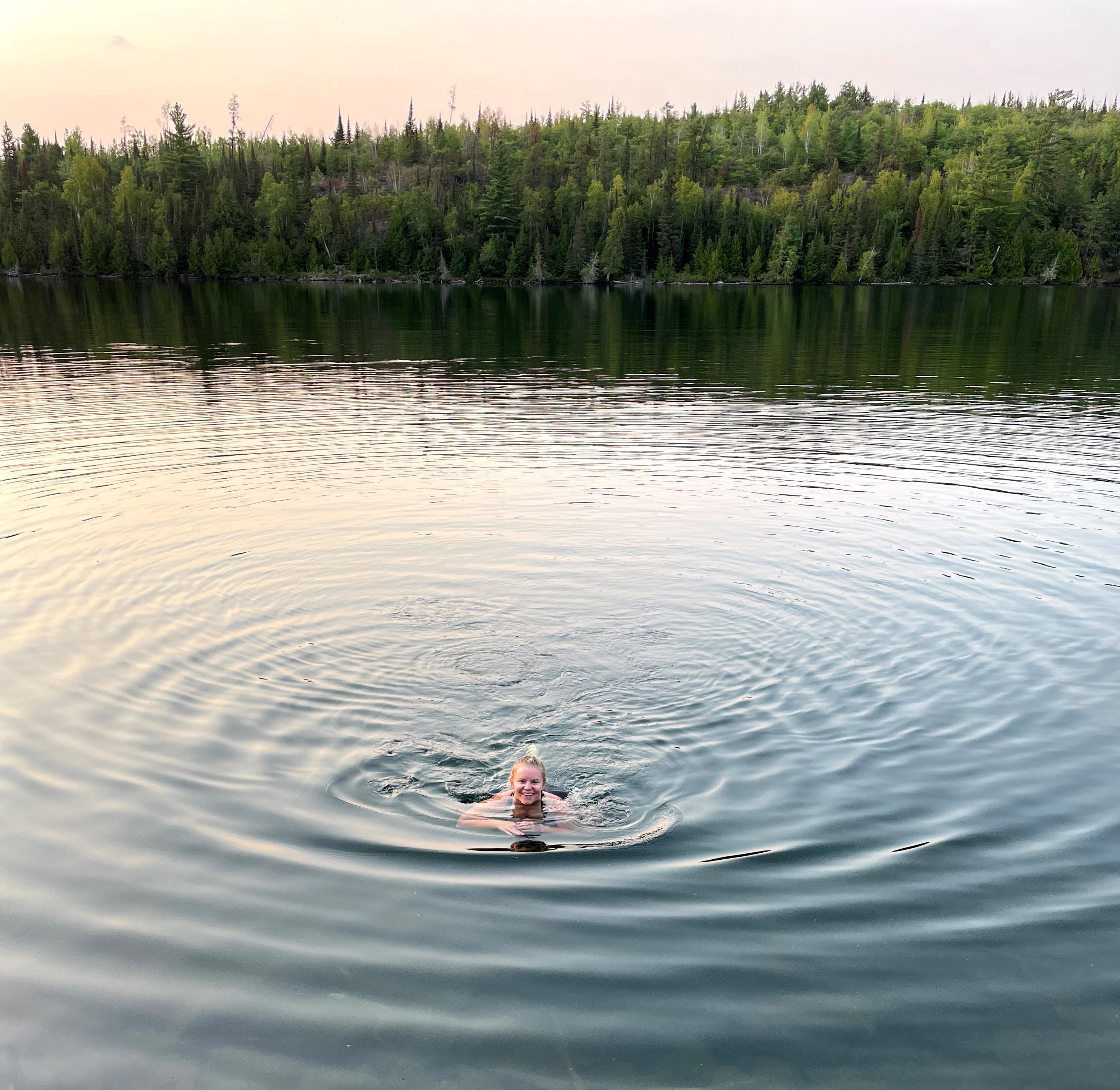
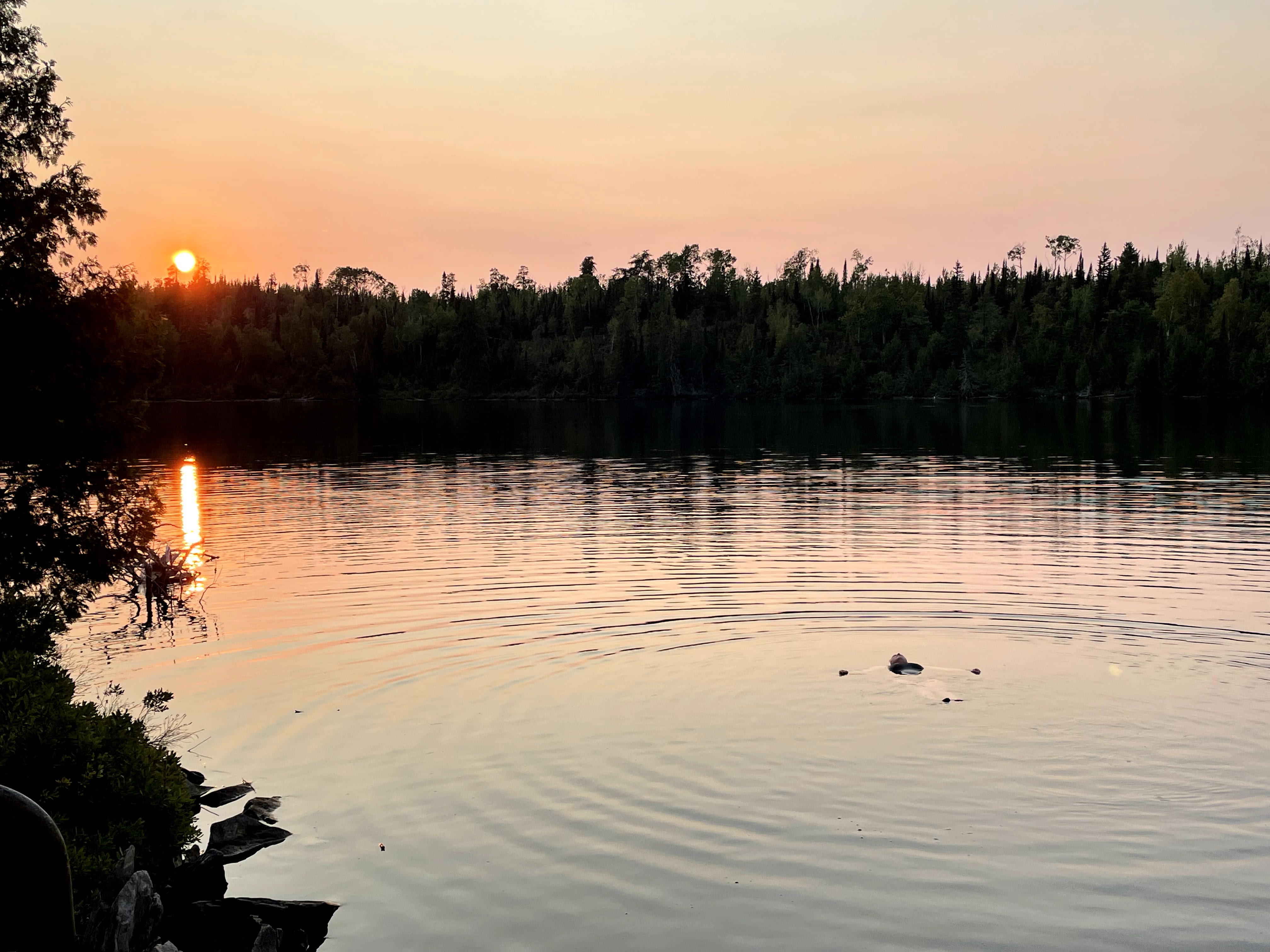
Life is simplified in the wilderness. The sun and stars are the clocks (though I don’t know how to ‘read’ the stars yet, I was aware of their movement through the night), food is life-giving and limited, water is abundant, the ‘work’ of paddling and portaging literally gets us to a new place, and art and beauty surround us. Challenges are simplified also. As Emily said the day before as we sat in the middle of a lake with no campsite in sight—what other choice do we have but to keep paddling? In the modern world, with copious choices for nearly everything, challenges and even day-to-day events can be confusing—too many choices do not give a person clarity. Being in the wilderness allows your mind and soul to rest and rejuvenate, and even challenges can bring peace.
This is the third post in a series of five that chronicles my experience of five days in the Boundary Waters Canoe Area (BWCA). It is best to read the whole series from the beginning (Anticipation) in order to understand certain things I refer to in my other posts.
Reckoning
What keeps us from the restorative bliss of sleep? Who are the gatekeepers that decide whether we have restful sleep or fitful stirrings and wide-eyed starings into the dark? My first night in the Boundary Waters was the later. I was tired enough, and no caffeine gatekeeper propped my eyes open. It was not the fear gatekeeper, as I was on solid ground, and I was not afraid of any potential bears bumbling into our campsite. (I have an intimate past with the fear gatekeeper who has kept me awake far too many nights of my life.) Pain is a common gatekeeper—physical pain or emotional pain, it makes no difference—there is no restful sleep for the pained, a relief though it is. I think I was under the influence of the busy-mind gatekeeper—I had so much to think about and process from the unusual, out-of-my-comfort-zone day. Drinking too much water towards the end of the day didn’t help any. Zzzzipping out of the tent and zzzzipping back in seemed to make enough noise to wake all the critters of the forest. It was also too warm, too muggy, and too smokey, so I guess the discomfort gatekeeper was standing guard. The fitful sleep and star-staring was the background to the most difficult day of our trip…and to my most important one.
When I opened my eyes and saw the red ball of sun rising over the water, I zzzzipped out of bed and found Chris already throwing in a line. It’s good his day started peaceful.


We had a ‘big’ breakfast—hashbrowns, scrambled eggs (thanks to Egg Beaters) with bacon bits, and hot tea and coffee. Water for coffee, cooking, or washing dishes is dipped from the lake and boiled for a couple minutes.

After breakfast, we cleaned up, packed up, and got ready to travel into Knife Lake. We talked about portaging, as we had five portages to get from Birch Lake to Knife Lake. Portages are the ‘hiking’ portion of a BWCA trip, how we get from one lake to another or around a rocky rapids area of a river that connects two lakes. Ideally, you do it all in one trip with everyone carrying something. Something meaning packs, canoes, paddles, and fishing poles. I was excited for my first portages!

But first, a breakdown…and I don’t mean an analysis of the game of portaging. I mean me, once I was in the canoe again…trying to paddle. It’s like my arms weren’t working right. I felt weak. The kids were already a ways ahead of us. I would put the paddle down, hang my head down, and try to talk myself back to it. It wasn’t working very well—my paddle and head were down for longer than I was moving forward. I started to cry. I was so frustrated with myself. Unfortunately for Chris, I took a bunch of that frustration out on him. As the ‘back’ person in the canoe, he was responsible for steering us, and I was the forward motion ‘power.’ Since I wasn’t bringing the ‘power,’ it felt like we weren’t going anywhere—and if we were, it felt like the wrong direction. I was chippy with him, asking those no-answer questions like, “Why are we going in that direction?” and “Where are you going?” He probably didn’t hear half of them. I don’t remember how long before the kids stopped and waited for us. I felt, once again, like I couldn’t do this. Emily was a little exasperated with me, ” Mom, you can’t keep doing this!” More tears, more frustration with myself. Finally, Aaron told us when campers were having a hard time, everybody would just take a break. Put the paddles down. Sit still. Breathe. So we did that. I don’t know how long…but it worked. I was able to paddle again.
We glided through the long, narrow, beautiful Birch Lake until we got to our first portage—a 40 rod portage. (One rod is equal to 16.5 feet, which is the length of an average canoe.) I heard him before I saw him. He greeted us with some chattering calls. I quickly pulled my camera from my life jacket pocket, thinking he would fly away. But he didn’t. He was the portage gatekeeper. He watched us disembark from the canoes, get the packs and canoes hoisted onto our shoulders, and walk into the woods! I heard him make the same calls when a canoe behind us came to the portage!


On the other side of the portage, we stopped to celebrate our first one! I now knew I could carry a personal pack, which Aaron estimated to be between thirty-five and forty pounds. But it was the kids who really impressed me—how they easily carried a pack and a canoe!
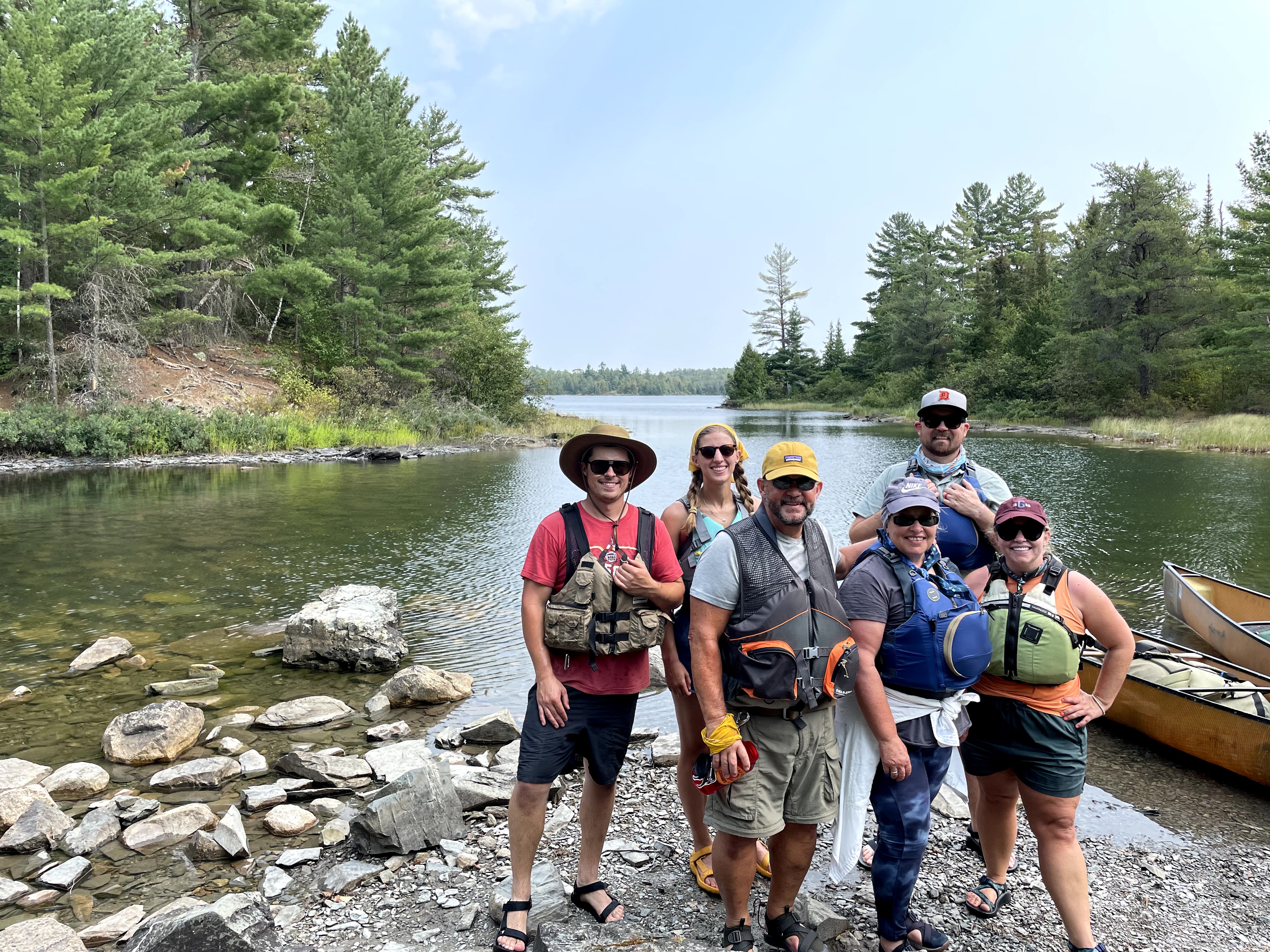
We had portaged around a rocky creek, and I didn’t realize until looking at the map just now that the creek belonged to Canada. We were walking the line and canoeing the line between two countries.



We lunched in Carp Lake. We portaged into Melon Lake, a small, shallow lake with the clearest water—it was like a natural swimming pool. We portaged again and again up the Knife River. Our portages were smooth—everyone knew what they were carrying and who was helping who with lifting packs or clipping water bottles. After our longest portage of the day, 92 rods, we opened up into Knife Lake. The water was ‘bigger’ than we had traveled all day, more open, windier, and wavier. Our first priority was to find a campsite.





Every campsite, marked with a red dot on the maps, was occupied. What was strange is we had only seen two groups traveling all day. We felt like the lone canoers on Knife. We paddled on. The air got smokier, and the sun got hotter. It was somewhere on Knife Lake where I had a reckoning with the water and waves. The kids were scouting each campsite, so often they were headed in different directions, and Chris and I tried to just move towards them or between them. We didn’t really know where we were going—we were just going and knowing they were not waving us in to a campsite. In the reckoning, I gave in to the waves. In the reckoning, I rode on the deep waters. I was paddling strong and steady, and at times, it felt like we were skimming from wave top to wave top as light as a feather. While some of the others were voicing their discouragement, I finally felt like I could do this!

We passed about fifteen campsites before we changed course to portage into some smaller lakes to see if the few campsites on them were open. It also turned the loop on our traveling so we were heading back towards our entry/exit point instead of going farther north and east. The campsites on the first two lakes we portaged into were taken. As the sun got lower in the sky, Aaron was formulating his plan of what to do if no campsites were available by dark (we found out later.) We portaged out of Spoon Lake through a mucky, swampy, muddy portage. The muck was so deep we couldn’t get out of the canoes, but the water was so shallow and littered with logs that we got hung up. Aaron helped ‘lift’ our canoe over the logs from his canoe and by balancing on the slippery logs until we got to solid ground. As we began our eighth portage of the day, we hoped and prayed the next lake would offer us a campsite. We didn’t paddle long before Aaron scoped out a place that barely even looked like a campsite—but it was, and it was unoccupied! We had made it!
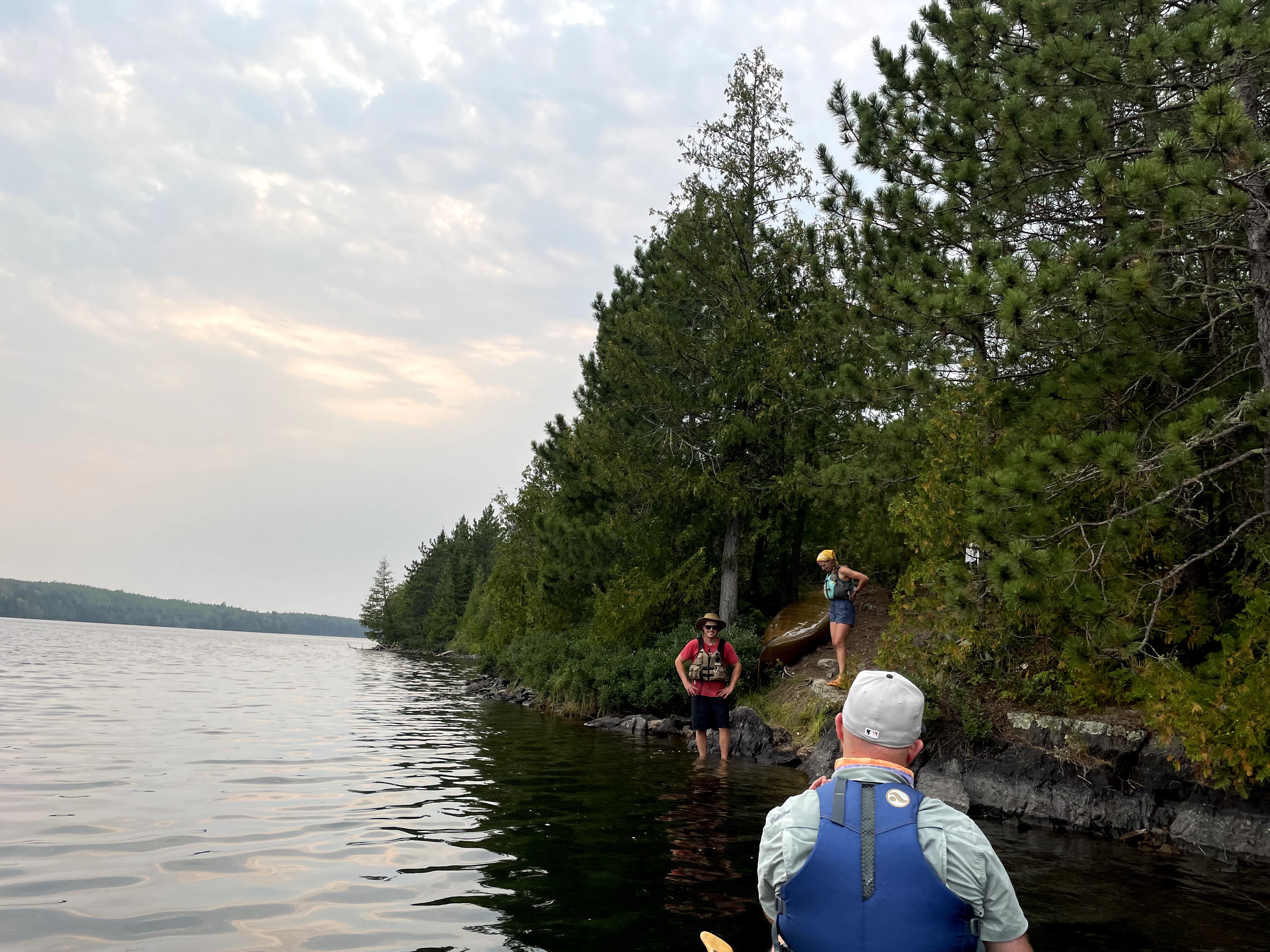
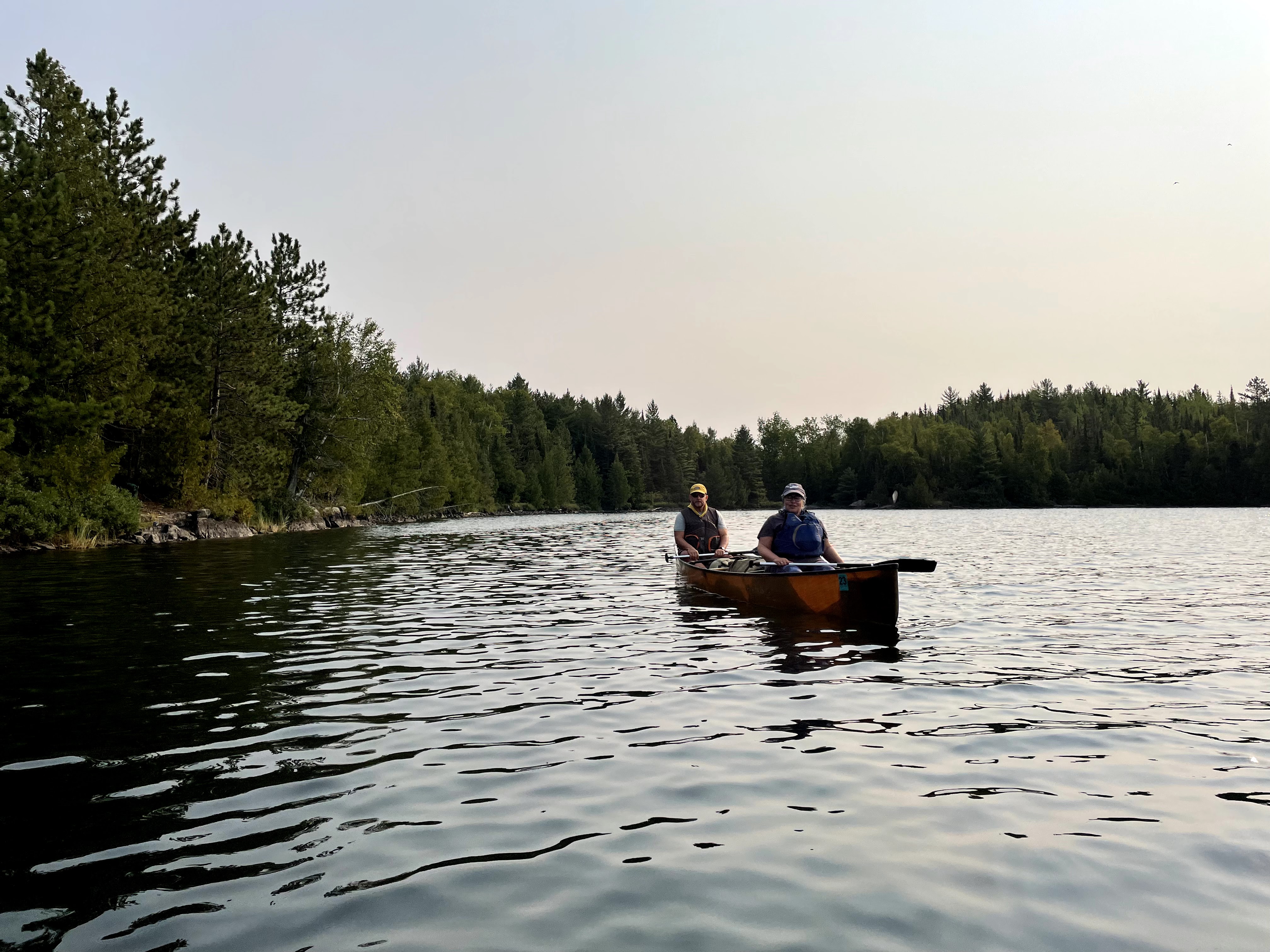
We unloaded, pulled the canoes out of the water, and got down to the business of filtering water and preparing supper. We had pizza! The pre-baked pizza crusts had been quartered in order to fit in the bear barrels. We topped each with pizza sauce, green peppers, onion, pepperoni, and cheese and ‘baked’ them in a frying pan over the backpacking stove. They tasted so good! We cleaned up quickly, set our tents up in the very small, bumpy area around the fire grate, stuck the bear barrels under the canoes for this one night, and soon the mosquitoes chased us into our tents. What a big, big day!


A reckoning is an appraisal or judgement of a situation. It is often used in a financial way of settling accounts. In a spiritual way, it is wrestling with our inner thoughts and emotions about any given thing, usually when our backs are up against the wall or in my case, when in the middle of a lake in a canoe for hours with no campsite in sight. Not only did I have to reckon with my feelings of fear about the deep water and the waves, I also had to reckon with my feelings of inadequacy. That part actually played out over the five days, but I made a huge step forward in my self-confidence. Later, after we were off trail, Emily asked me why I thought I needed to keep up with the ones who were so much younger and more experienced. Hmmm, that’s a good question.
Our quiet timekeeper (who had a watch) told us we had been on the water for eight hours that day. I had no concept it had been that long. We traveled through eight lakes, big and small, and had hiked eight portages. That was the accounting, the summing up, the reckoning of our day #2 in logistic terms.
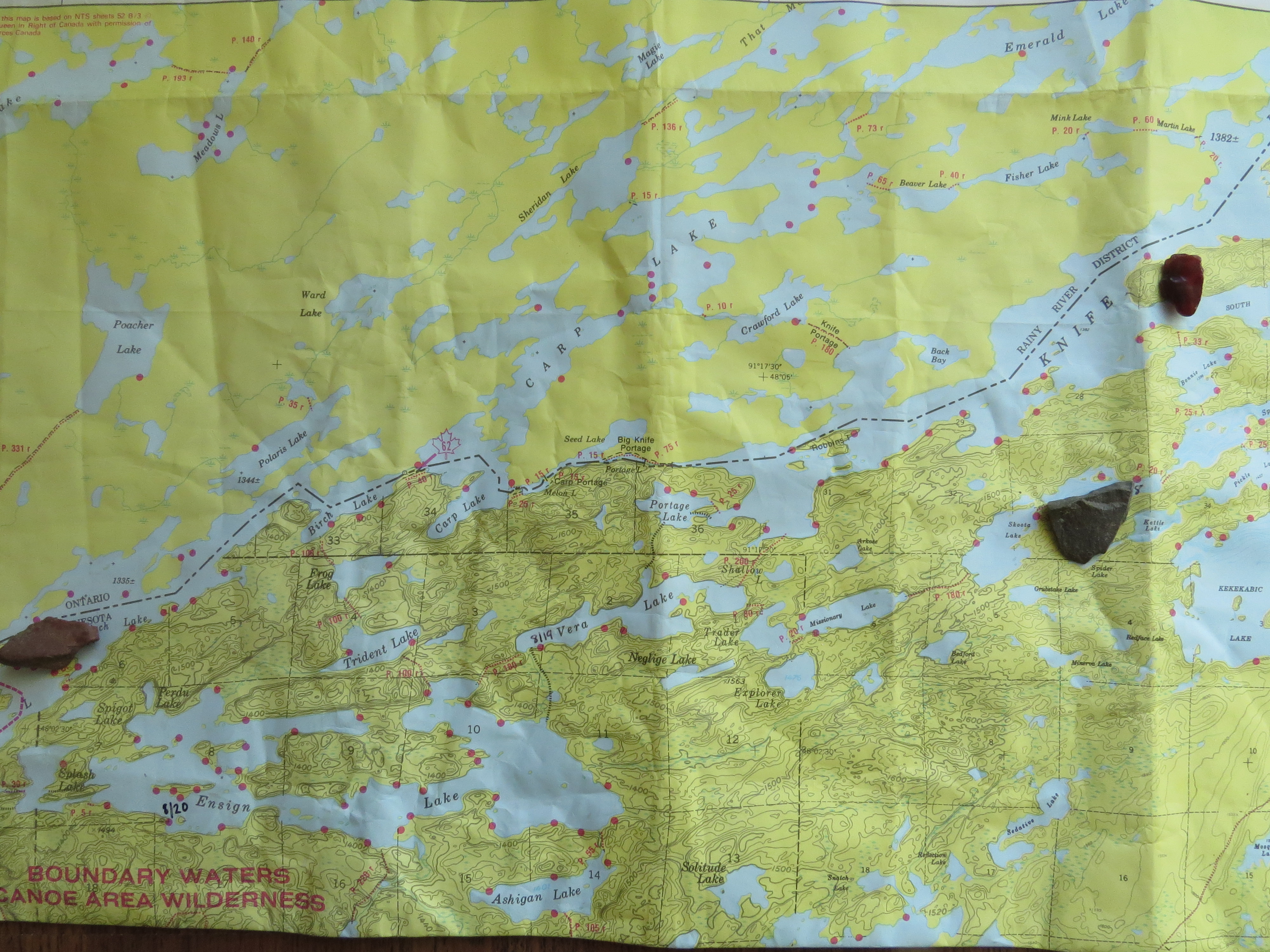
The reckoning inside myself probably wouldn’t have happened without the challenge of all those eights, and for that reason, I am grateful for the day. I wondered how my sleep deprivation had played into it all—had it opened me up to the reckoning? I know I’m not proud of my snipping at Chris all day long or of how raw and vulnerable I felt in the morning, but it led me to a triumph I didn’t think possible. So respect to the gatekeepers, whoever they are.
This is the second post in a series of five that chronicles my experience of five days in the Boundary Waters Canoe Area (BWCA). It is best to read the whole series from the beginning (Anticipation) in order to understand certain things I refer to in my other posts.
